#and also in a way it's just the morally and philosophically correct thing to do? like if your choice could possibly do harm to someone
Text
Also idk if I can elaborate on this in beautiful enough detail, but I think that the Autobots going through unreasonable amounts of effort to save other people even at great personal cost to themselves is literally something good about them, and if you try to criticize that as a way the Autobots are “bad” then I really don’t get you.
#squiggposting#how do i say this without overstepping on experiences i don't have#in the real world when people do things like emergency services or whatever... the foundation of that type of work#is to do something objectively dangerous and risky to yourself on just the bare chance of saving others#there are a lot of safety regulations-- everything from just day to day use of equipment#to entire protocols that emergency services and other people use#whose entire purpose is 'we need to go above and beyond'#'so that we know beyond a shadow of a doubt we have done everything we can do to protect others'#and like that's the principle that the autobots embody. and it's not just a story thing#that's something that happens in real life too. in real life we valorize people who didn't have to do everything they could to save other pe#people but did it anyways. you know???#like the point isn't to say 'if you don't kill yourself to save others then you're a bad person'#the point is to say that we valorize people who DO go above and beyond because they embody the greatest standards of care and selfishness#so like for example yeah the autobots often protect organic species at great tactical loss and personal danger to themselves#but it's because the principle of equality and protection guides them such that they believe this is a noble pursuit#because it is. it is noble to do what's difficult and inconvenient to save other people without expecting recognition#and also in a way it's just the morally and philosophically correct thing to do? like if your choice could possibly do harm to someone#the moral response is to go 'maybe i shouldn't do that because i don't want to hurt people for my own ends'#not for you to go 'well i might NOT hurt them by accident there's only a chance of it so i'll just keep doing my thing'#people who disregard others because 'it's probably not going to hurt them' or 'it's not my problem if they get hurt'#are not people that we would generally call admirable or morally correct#and i think the existence of so many safety and ethical standards IRL proves this#because people/society as a whole know that we have a duty to be SURE that we don't hurt others even by accident#and we have a duty to check whether people might get hurt by accident even if we're 100% sure that no one will get hurt.#it's like fucking checking your windows before you reverse your car. yes you already looked once so there's probably no one behind your car#but it's the responsible and moral thing for you to keep checking your mirrors for the 1% chance that there IS someone#sorry for ranting
4 notes
·
View notes
Text

I feel like my answer to this is kind of boring.
Fight Club and The Boys.
People who don't see these as cautionary tales but role models to emulate.
And not just the weirdos who idolize Homelander. Billy Butcher may be fighting on the righteous side of things most of the time but he is not a hero.
This was posted in The Last of Us subreddit and I guess my annoyance there would be that some people thought there was a definitive answer to the philosophical questions the ending elicited. (with regard to season 1 of the show)
The ending was very intentionally supposed to make different people feel a certain way depending on their relationships and circumstances. We are supposed to discuss and debate the morality rather than authoritatively say "this is the correct interpretation."
Also, it's easy to say you'd do the most objectively moral thing when things are hypothetical.
1K notes
·
View notes
Text
The Taste of Shame (2)
[ dom!modern • Aemond x friend sister • female ]
[ warnings: doubts related to sex work, panic attack, remorse and depression, fluff, sexual tension ]

[ description: Aemond works as a professional dom, fulfilling the various fantasies of his female clients - however, he guards his privacy and does not enter into any relationships with them, recognizing that he does not want or need it. It turns out that what he wants and what he doesn’t no longer matter when he meets his friend’s younger sister for the first time. Slow burn, sexual tension, doubts related to sex work. ]
Series & Characters Moodboard
Aemond NSFW Alphabet
* English is not my first language. Please, do not repost. Enjoy! *
Next chapters: Masterlist
_____
Walking to the lecture they talked about everything and nothing; for the most part, she was the one speaking, telling stories or asking questions, guiding her bike beside her by the handlebars, while he just added his thought or simply remained silent, listening to her.
They arrived at the Community Centre true to her word very quickly and indeed he immediately saw posters announcing that there would be free lectures by philosophers in the fields of contemporary ethics.
Robert's sister padlocked her bike in the designated area and they both went inside, following the signs. They entered a large, neo-classical hall with beautiful pillars and rich ornamentation on the ceiling, reminding him of a theatre or opera house.
They sat side by side on seats in one of the first rows − she explained to him that the presenter would be asking questions and, among others, her professor would be answering.
Indeed, the discussion was remarkably interesting and he caught himself drawn in; the men were talking among themselves about capital punishment, attitudes to the treatment of other humans and animals, warfare and human-wide conflicts.
However, he felt a cold sweat on his back and a tightness in his throat, his heart starting to pound like mad when the presenter asked the next question.
"As we know, a lot of young people start, as they say in modern times, sexworking − whether they show up on webcams or have sex for money. How do you, Professor, view this, do you think it's good for the psyche of such people? Is it morally right?"
The professor grunted and corrected his glasses with a slight hand gesture; he was a grey-haired, elderly man with a kindly, calm face.
"It depends on a number of factors. Firstly − what that young person's goal is. When we choose our job, we usually want more than just to earn money, most people's dream is to do things that fascinate them, that they are fulfilled in. Of course, people are also fulfilled in the sexual sphere with their partners, however, what happens when sexuality becomes a profession?
Well, in a way, two things are then combined that can be very destructive to the psyche − materliness and one's own body. At the same time, we make the decision ourselves, so it is not morally wrong if it involves two adults who agree to it, but there is an internal objectification, a selling of some part of our intimacy.
Of course, one can feel good about it. One may even like it. One should not tell such people that they are denying something, or say that they are selling themselves, that they are pricing their value. You see, it is not for us to judge. Everyone can do what they want with their body, it is their unquestionable right.
However, the danger arises when, underneath this materialistic approach, there is a desire for self-destruction, a desire to simultaneously dominate, to be in charge − I decide what happens to my body − and, at the same time, I desire to humiliate myself in my own eyes − I sell myself and I'm nothing, I don't want affection because I don't deserve it.
This issue is very complex and delicate, judging too quickly, especially by outsiders, will be even more hurtful to such people, a confirmation that they will never be loved and accepted, so they will be afraid to make sexuality emotional, which will lead to the opposite effect that we would all like."
The presenter nodded with understanding.
"If the professor were to state what it should look like in an ideal world, what would the professor say?"
The man laughed good-naturedly, stroking his white beard.
"I don't have an answer to that. I think that in an ideal world, the person who is made for us would be highlighted to us in green and those who hurt us in red. But we don't have that option. I think the fundamental mistake of every human being is to make judgements prematurely, instead of being willing to understand, to offer conversation, to support.
Calling someone a whore or a slut has never helped anyone, what's more, it only makes such people even more likely to have suicidal thoughts and be afraid to seek help when they feel they need it, because they are scared of revealing themselves to their parents or loved ones."
The presenter moved on to the next topic, but he heard nothing more, staring blankly at the floor, leaning forward so that his elbows were on his knees − he felt himself trembling all over, his eyes burning from the moisture that had gathered under his eyelids, his throat all clenched.
He felt her hand on his back and he shuddered, glancing over his shoulder at her with wide eyes − she was leaning over him worriedly, he could smell her pleasant scent again.
"Are you all right? Do you want to go out for some fresh air?" She asked frightened, clearly seeing how pale he was, and he nodded in embarrassment.
By the time they got outside it was completely dark; he reached with his shaking hand into the inside pocket of his leather jacket, taking out a cigarette and a lighter, firing it quickly and putting it into his mouth.
He felt her looking at him − they were standing in the square in front of the main entrance where there was no one but them, all around them was the loud hum of moving cars.
For some reason he felt desperate and miserable, weak, small; he clenched his eyes shut, shaking his head, trying to pull himself together. He sat down on the cold stone steps and she immediately sat down next to him, far too close.
He sighed when he felt her hand on his shoulder, stroking him gently, her warm breath on his cheek cool from the crisp evening air. He let out a loud puff of smoke with his lips, thinking only of how he had never let any woman touch him.
He placed his hand on hers, wanting to feel her for once, her skin soft as silk, exactly as he had imagined; he looked at her in pain, her eyebrows arched in worry, in incomprehension of what had actually happened.
"I'm selling myself." He said finally, desperate, and she blinked as if she didn't understand what she had just heard.
He took a drag again, not taking his eyes off her, and let the smoke out through his nose.
"I do all sorts of fucked up things to women for money and get satisfaction out of it, you know?" He asked in a low, trembling voice, feeling devastated how tears of shame one by one began to run down his face.
He felt himself shaking all over and thought he was an idiot, wondering how he could have said that to her. For some reason, he felt something inside him break.
He wanted her to know, to tell him she was disgusted with him, to look at him with that look full of reserve, to tell him it was nothing and just go away simply to let him finally stop thinking about her.
He saw her tighten her lips, her eyes turning red, her eyebrows arching in sorrow as if she was in pain as he was. He felt a pleasant shudder when her hand stroked gently through his hair as if he were a small child, and then she hugged her face to his cheek and simply remained silent.
She didn't say anything.
She stayed.
She wanted to comfort him.
Delighted at this revelation, he burst out into a quiet, mournful sob, leaned over and snuggled his face into her neck, wanting to hide from his own shame and remorse, from what she might think of him, from what he feared and could not forgive himself for.
Why did he have to be like this?
Why exactly did this give him fulfilment?
He sighed quietly as she put her arms around him and hugged him, her soft hand stroking his cheek with gentle, slow movements, her face nestled against his hair and placing a gentle kiss on it.
"You didn't do anything wrong." She whispered finally; he swallowed hard, rubbing the tip of his nose against her neck, brushing his lips gently against her bare skin, again, and then again.
He felt her tremble and tighten her hands on his leather jacket, his manhood in his trousers completely hard.
He had no idea what had just happened between them, but he didn't want to stop.
After a moment, as his emotions left him he realised what he had done.
That he had told a complete stranger about who he was, revealed to her his darkest secret.
This thought made him panic − he got up abruptly and mumbled through his tears that he would go home already, that he apologised to her for everything, not listening to her pleas to wait for her, running quickly down the stone stairs, walking ahead.
He looked over his shoulder as he turned into the corner of the next street and noticed with some kind of disappointment that she was not following him.
He burst out into uncontrollable sobs for the second time once he had locked himself in his car having complete chaos in his head, feeling that he was going through some kind of panic attack.
He thought that until he'd met her he hadn't felt this way, that the idea that he couldn't date her because of what he'd done made him start to regret it all.
What was he supposed to do now?
He reached for his phone hearing it vibrate and unlocked it quickly seeing as many as three new messages from her.
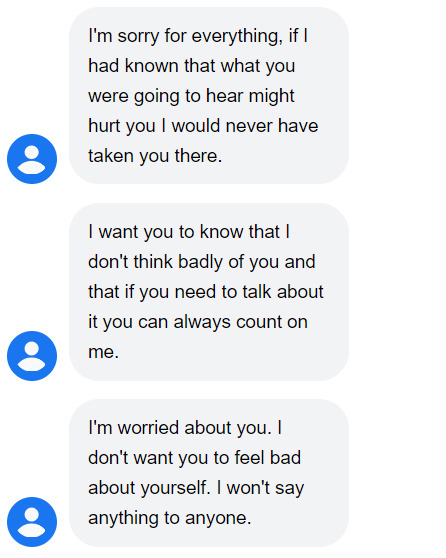
He clenched his eyelids, dropping his phone on the other seat, hiding his face in his hands.
He needed to calm down.
He sat like that for a few minutes in silence, not thinking about anything, just breathing, and then he drove home as if nothing had happened.
He entered his flat, took a shower, ate something and then turned on the TV, all mechanical, completely empty; he shuddered when he got a new message, reaching uncertainly for his phone and felt an unpleasant twinge in his stomach when he saw it was one of his clients.
She wanted to meet the next day.
No, he thought.
I don't want to.
He wrote her back that he was taking a break from it all for a while.
He was infuriated when she started texting him to tell him not to do it, that she needed him, that meeting him made her want to go on living.
He slammed his phone furiously into the wall.
What about what he fucking needed?
When he picked it up after several minutes he found that it worked despite the cracked screen.
He accessed the last messages he'd received from Robert's sister and began typing quickly to her on his phone's keypad.
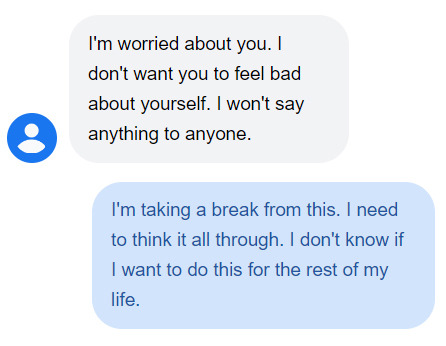
He pressed his lips together when he saw that she immediately displayed his message, a bubble popped up in his app window indicating that she had just written back to him.
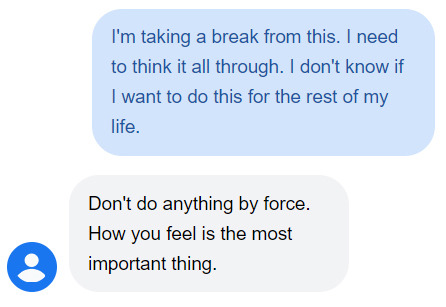
He swallowed loudly, writing her back without thinking, without controlling himself, allowing himself to shamelessly write her exactly what was in his head.
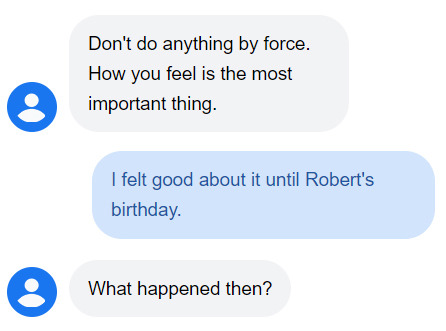
He stared at the screen with a pounding heart, wondering whether to do it or not, walking restlessly around his living room with his phone in his hands − he typed out the answer slowly, feeling that he was hot.
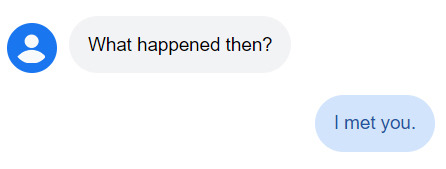
She didn't reply for a long time even though he could see that she had displayed his message.
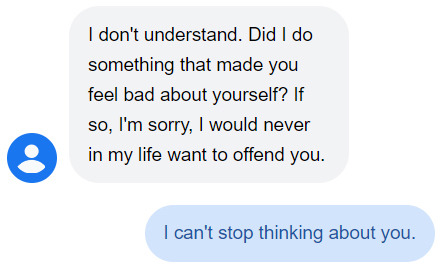
He squeezed his eyes shut, shaking his head, laughing despairingly under his breath, not believing how desperate he was.
He'd known it from the moment he'd seen her, when she'd gotten off that fucking bike and looked at him with those big, innocent eyes of hers.
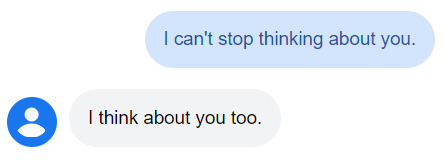
He stood looking at her message as if stupefied, reading it again and again, unable to believe it, feeling like he was about to die from the arousal and heat he felt in his chest, his fingers trembling as he tapped out his reply to her.
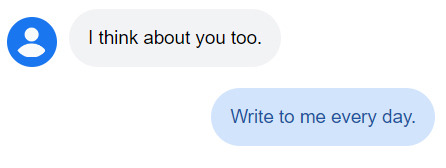
And so she did.
He didn't dare propose to meet her alone, knowing how that would have gone down on his part.
He didn't want to scare her off.
However, they wrote with each other for days, even during his classes; Criston and Robert laughed at him for having a girlfriend and not even wanting to introduce her to them.
He didn't care.
She was the first person he told about how it all started, what he felt when he did it, what aroused him and what repulsed him about it all.
She listened to him and answered him with sincere concern and worry, without judging him, without pretending it was a simple and obvious subject, giving him a sense of comfort and understanding.
He made it clear to her that he had refrained from any contact with strange women for the time being.
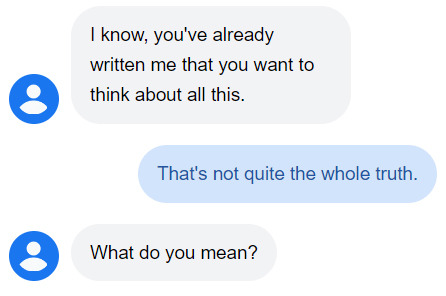
He licked his lower lip as he lay back in his bed, writing her off quickly.
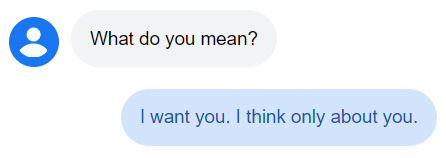
He swallowed hard when she wrote him back after a moment.
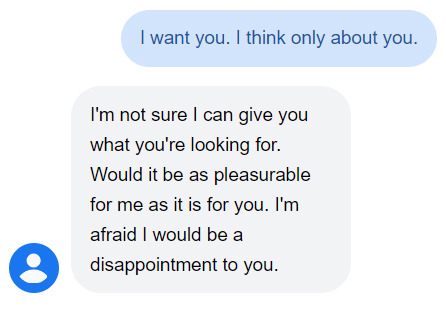
He felt a squeeze in his heart at her words, some kind of pain that she thought of herself that way, that she saw herself as just another person he wanted to take out on.
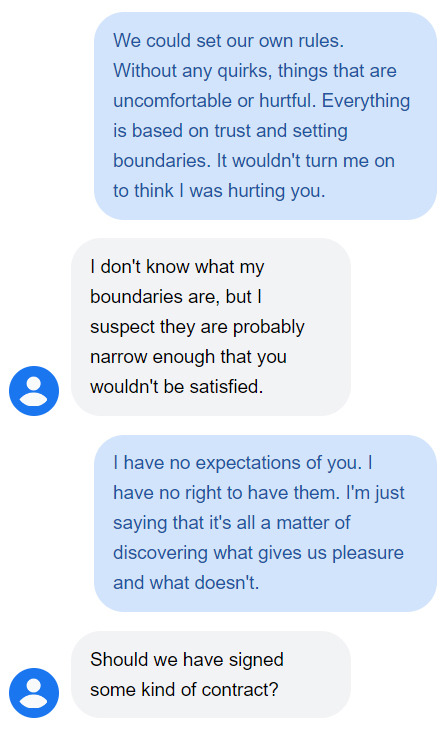
He chuckled involuntarily, typing back a quick response to her question.
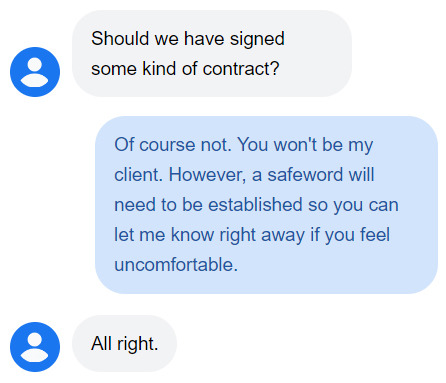
He blinked, looking at his screen with a pounding heart, not believing what he read.
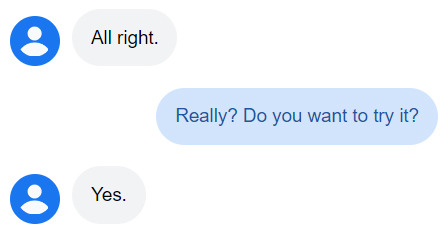
______
Aemond Taglist:
(bold means I couldn't tag you)
@its-actually-minicika @notnormalthings-blog @nikstrange @zenka69 @bellaisasleep @k-y-r-a-1 @g-cf2020 @melsunshine @opheliaas-stuff @chainsawsangel @iiamthehybrid @tinykryptonitewerewolf @namoreno @malfoytargaryen @qyburnsghost @aemondsdelight @persephonerinyes @fan-goddess @sweethoneyblossom1 @watercolorskyy @randomdragonfires @apollonshootafar @padfooteyes
#aemond fic#aemond fanfiction#aemond targaryen#hotd aemond#aemond x oc#ewan mitchell#ewan mitchell fanfic#dark aemond smut#aemond smut#aemond targaryen smut#ewan mitchell smut#modern aemond angst#dark modern aemond#modern aemond smut#modern aemond#ewan mitchell fanfiction#aemond targaryen angst#aemond angst#hotd angst#dark aemond#dark aemond targaryen#aemond kinslayer#prince aemond#aemond#aemond one eye#prince aemond targaryen#aemond fanfic#hotd fanfiction#hotd fanfic#ewan mitchell fandom
371 notes
·
View notes
Note
Genuine question. But how are radical feminists; women's rigths activist who are exactly trying to detect, address and attack the roots of the patriarcy and it's problems (the literal definition of radical, "By the root") to make the world a better place for women and girls, comparable to religious evangelicals, incels and actual Neonazis?
Dunno, correct me if I'm wrong, but last time I checked those 3 last groups and unlike actual radical feminists, not only they don't support but openly and actively despise and try to eliminate progresive ideals like homosexual rigths, reproductive rigths, end workfield innequality, among many others.
Context: This anon is in response to this post. I do want to apologize to anon up front, because I assumed they sent this ask in bad faith based on several other bad faith asks that have been sent to me in the past. They however, did ask this in earnest. I genuinely hope this is a valuable resource to you and anyone else this post crosses paths with.
Okay so there's a lot of things I want to get into here and it's gonna get long so I'm going to break it into chunks. We're gonna look at what political extremism is, what a rhetorical fallacy is, what Feminism is (broadly speaking) and then do a deep dive into the actual nitty gritty people and politics of Radical Feminism in opposition to other types of Feminism.
TL;DR - Radical Feminism is an extremist, female supremacist, hate movement. It has more in common with Political Right / authoritarian extremist movements than it does with any Politically Left / liberation based radical movements.
So let's start with examining political extremism. What is Political Extremism? In turn, what is Political Radicalism?
Political Extremism is a very broad category of belief and action that gets thrown around a lot. Most people just use it to mean "strong politics that exist outside the status quo" however, I'm more interested in the way Astrid Bötticher defines Extremism vs Radicalism. In her definitions (here) she essentially describes that "Political Extremism" tends to get applied to Right Wing leaning politics and "Political Radicalism" tends to get applied to Left Wing leaning politics. She states that there is a fuzzy line between the two (think about the application of the phrase "Go so far left you go right") but that finding ways to define and distinguish the two is still important to political discussion.
Bötticher describes that Radical Politics tend to have a focus on:
anti-violence/selective use of violence
building a positive future
democracy/emancipation
pro-human rights, specifically in the context of providing them to the under privileged
disrupting status quo without a total destruction of society/diversity
standing in opposition to Systemic Institutions and The Establishment
coexistent withdraw with society when existing in small numbers
universal morality - a moral system that applies to all
egalitarianism/sovereignty of the common people
ideas inspired and informed by philosophical movements, starting with the 18th century Enlightenment onward
In contrast she describes that Extremist Politics tend to have a focus on:
violence as a legitimate form of action
looking towards an idealistic past
anti-democracy/authoritarianism/intolerance for other ideologies
anti-human rights (specifically in the context of people outside their own ideology - my own addition)
reinforce status quo while closing society off from conversation and diversity
standing in opposition to Systemic Institutions and The Establishment and also anyone who disagrees with the Extremist dogma
provocation and disruption, even when existing in small numbers in society
particularistic (exclusive) morality - a moral system that only applies to the Extremist group
totalitarianism/authoritarian control
ideas inspired by fanatical, usually (but not always) religious ideas that claim to hold a monopoly on truth on the basis of their own vision (that last part is especially important)
As you can probably gather, under these definitions generally speaking one would define most progressive movements as Politically Radical and most regressive movements as Politically Extremist. The Feminist Movement is, by and large, a Politically Radical Movement. Our conversation doesn't end here though. We have a lot more ground to cover. This is just the framework.
So, now that we've established the characteristics of a Politically Extremist movement, let's delve into the rhetoric they use to assert those aspects of themselves.
What is a rhetorical fallacy?
Rhetorical Devices are an important part of not just politics, but every day life. We use them constantly - I'm using them now, you use them, everyone uses them. When I speak to you, the reader, and appeal to you directly I am invoking Pathos (Emotional Appeal) by creating an air of casualness - as though we are engaging in a conversation. When I give definitions, statistics, cite sources, I am invoking Logos (Logical Appeal) by showing there is traceable, factual, credibility to the things I am saying. When I say that I have been studying Political/Feminist/Philosophical Theory both academically and in my own free time for the last decade of my life I am invoking Ethos (Ethical Appeal) by asserting that I have put an immense amount of time and dedication into this topic to showcase my own credibility.
The important thing about Rhetorical Devices here is how they are applied - especially in political discussions. When applied incorrectly or maliciously Rhetorical Devices begin to fall into Fallacies.
Fallacies are errors, or tricks, of reasoning. The provided link is from a college writing textbook and I highly recommend reading it over if you're able (genuine shout out to LibreTexts for their efforts in making textbooks free and accessible to the public). It gives a good enough explanation of fallacies as a whole that I won't be going too in depth myself, so as not to distract from my main points.
The specific type of fallacies that I'd like to get into are Linguistic Fallacies (equivocation, amphiboly, combination of words, division of words, accent, and form of expression) because they are a type of fallacy that Political Extremists (and really? also most people in politics with weak argumentative skills) like to employ a lot to make their points seem stronger or to manipulate their image. Though it is not listed as a part of the six Linguistic Fallacies, I consider Etymological Fallacy to be a kind of Linguistic Fallacy, as it relies on the explicit dissection of language.
Political Extremists and other oppressive regimes often obscure their nature through carefully chosen linguistic descriptors that rely on fallacious intent. Early Nazis called themselves National Socialists when they were, in fact, not Socialists. The Democratic People's Republic of North Korea is not a Democratic Republic for the People - it is a Dictatorship - and the Chinese Communist Party of the People's Republic of China is not Communist and China is not a Republic.
To obscure yourself behind intentionally chosen progressive sounding language to gain yourself more followers who simply say "Hey, Democracy and Socialism are good! Those guys must not be that bad!" or "Hey, I agree with women's rights and liberation! I think the world should be a better place for women and girls! Those Radical Feminists must be onto something!" is to rely on an intentional political obfuscation tactic that uses the Fallacy of Equivocation.
What is Feminism? What are the different schools of Feminist Theory?
A distinct and important part of Feminist Philosophy is quite genuinely - debating how to define Feminism and it's goals. Though they all follow similar themes, there are a lot of variant ways of defining this. Some definitions of Feminism include:
"The belief in social, economic, and political equality of the sexes." - Britannica / Merriam-Webster
"[The goal of feminism is] all genders having equal rights and opportunities." - International Women's Development Agency
"[Feminism is] the movement to end sexism, sexist exploitation, and oppression." - bell hooks
Generally speaking though, Feminism places itself as a movement for the advocacy of Women as a Class of people, operating under the context of combating / eliminating gender and/or sex based oppression - depending on the Feminist school of thought you are looking at.
Allison Jaggar, feminist scholar, defined four types of Feminism in her 1983 book Feminist Politics and Human Nature. Those types are: Liberal Feminism, Marxist Feminism, Socialist Feminism, and Radical Feminism. These tend to be the schools of thought you see brought up most often today.
I, personally, however, think that it is worth recognizing that there are in fact more schools of Feminist thought than just those four. In particular Intersectional Feminism, which was coined by Kimberlé Crenshaw in her 1989 paper Demarginalizing the Intersection of Race and Sex, and Postcolonial Feminism which began to get its footing in 1984 with the publishing Audre Lorde's essay The Master's Tools Will Never Dismantle the Master's House (taken from a 1979 speech) and Chandra Talpade Mohanty's 1984 essay Under Western Eyes.
Postcolonial and Intersectional Feminism exist in direct critique of the Whiteness that was (and still is now) pervasive in Feminist Literature through the 60's-80's and into the beginning of the Third Wave of Feminism, which I will get into shortly.
Who is Radical Feminism by and for as a political movement? Who are the people creating the theory, past and present? Who are the people running the movement via theory, political organizations, and who are the faces of the movement? Who do they truly center?
Let's start with some basic Feminist history for a moment. The Feminist movement is broken into several waves. Presently, we are in what scholars are beginning to define as the Fourth Wave of Feminism, so let's briefly look at all four.
I want to state right off the bat that Feminism and feminist history as a whole is very US American and British centric. The First Wave of Feminism is defined by the Suffrage Movement and (White) Women gaining the right to vote in the USA in 1920. The Second Wave of Feminism is defined by the sexual liberation movement, the beginnings of Queer Theory, and the foundation of Radical Feminism as an organized political movement in the late 60's ('67~'68) on the coasts of the US and in England. The Third Wave of Feminism in the 90's is looser and exists as a dialogue between movements like the Riot Grrls, long standing Radical Feminists, and Feminists of Color (particularly Black Feminists) critiquing the Feminism of the previous few decades. The present Fourth Wave is currently being defined socially by social media usage and the MeToo movement and academically by its continuing recognition of Intersectional Feminist work.
I do think it is deeply important to note the racial dynamics at play here and address the fact that the Feminist Movement has also always been extremely White in many ways. This is not to discredit the work of Feminists of Color, but to say that their work, labor, activism, and theory often goes unrecognized by White Feminists. As previously mentioned, the First Wave of Feminism is largely defined by the Suffragette Movement and women's right to vote - however, Black Women and other Women of Color were not allowed to be fully included in this movement by White Suffragettes. Black Women did not receive suffrage until 1965 with the Voting Rights Act. This was just 2-3 years before the beginning of the Second Wave. I have written about this to a larger extent here so I won't be diving too deep in this ask, since we're already getting very long here.
So let's dive deeper into the Second Wave and Radical Feminist history. I would personally argue that the publishing of the SCUM Manifesto and Valerie Solanas' attempt on Andy Warhol's life is what kick started the Radical Feminist movement. I have talked about this to a larger extent here in relation to Political Lesbianism and really - I just don't want to retype an essay I've already written.
TL;DR - While the SCUM Manifesto may or may not have been satirical (Solanas went back and forth on this publicly) it was the first published work to describe ideas integral to Radical Feminist literature. It was born out of the same New York spaces as the rest of the Radical Feminist Movement and spread thanks to the New York gay newspaper, The Village Voice, and the publicity from Solanas' attempt at Warhol. Male Dominance Theory, the inherent violence of males, the idea that women are safer with other women than with men, the idea that lesbianism or celibacy are the only safe sexual avenues for women, etc. etc. were all published first in SCUM in 1968.
Ti-Grace Atkinson could, and should, be credited with the foundation of organized Radical Feminist politics in written works with her 1969 piece "Radical Feminism". She was an active defender of the SCUM Manifesto and Solanas - going so far as to get in trouble with NOW (The National Organization for Women) during her time as the organization's president for defending Solanas and attempting to involve Flo Kennedy in Solanas' legal defense (pay-walled article, unfortunately). While Solanas wanted no involvement with Atkinson, Kennedy, or NOW it's clear her ideas and actions deeply impacted them and other Radical Feminists. The events with Solanas inspired Atkinson to leave NOW and form the October 17th Movement, which then became the Radical Feminist group The Feminists.
If we look at other foundational Radical Feminists from the late 60's and 70's - Shulamith Firestone, Kathie Sarachild, Carol Hanisch, Roxanne Dunbar, Naomi Weisstein - they all also share one trait in common with Solanas and Atkinson beyond their politics. Whiteness. The only Woman of Color present so far in this history is Flo Kennedy, and Flo Kennedy was open about "Not feeling Black" and not really having community with other Black people. Her work definitionally was more Intersectional than Radical Feminist, however she dedicated most of her efforts to time in Radical Feminist spaces. Unfortunately as the linked book review begins to describe, like a lot of Feminist history, Flo's actual person-hood has been stripped from her work. She is often either used as a Token Black Radical Feminist or as a Token Black Intersectional Feminist in Radical Feminist Spaces, depending on where you look and who you ask.
I don't have the time nor space to do an entire history lesson on Radical Feminism, but suffice to say the works of the women I have previously mentioned very much inspired the works of more commonly cited, more modern Radical Feminist authors like Andrea Dworkin, Sheila Jeffreys, Julie Bindel, Catherine MacKinnon. Again, all White Women. You look to modern Radical Feminist and Women's Liberation activism and you see the same reflected in your average Trans Exclusionary Radical Feminist as well as in the women in pop culture who are being celebrated by anti-trans Radfem spaces, like JKR and Kellie-Jay Keen / Posie Parker. Both of whom, by the way are actively buddy-buddy with conservatives and Neo-Nazi's. Shaun, the video essayist, has broken this down better than I can here (JKR) (Posie Parker).
Why talk about all of this? What is the relevance of political extremism and rhetorical fallacies in this conversation?
We began this essay (because, let's be real, that's what this is) discussing Political Extremism vs Political Radicalism so let's come back around to that and my claim that Radical Feminism is Politically Extremist, not Politically Radical now. Radical Feminists, like in this ask, have been in my ask box recently arguing that the "Radical" in "Radical Feminism" means "to the root" - like a mathematical root. That it means "Getting to the root of Patriarchy". However, I genuinely have not been able to find any such claim in any of my research. The "Radical" in "Radical Feminism" has always been used in the political sense of being "politically radical" in all of the reading and historical research I've done. Show me a legitimate source of this claim and I'll take it into consideration though.
I would like to breakdown Bötticher's list of traits of Extremism/Radicalism in relation to Radical Feminism now though, since we have established we are explicitly talking about Political Radicalism several times over.
1. violence as a legitimate form of action
Radical Feminism is founded on the idea that society needs to be completely dismantled in order to procure the safety of women. Be this by genocide, as SCUM suggests, or by a women led revolution as women like Firestone suggested there have always been roots of violence in Radical Feminism. Violence is a complicated topic in of its own right, which I've talked about my own feelings on here. I personally believe that the Radfem idealism towards violence and wanting to "flip" the violence of the Patriarchy back onto men - regardless of it is satirical or not - and the idea that violence begets violence falls under this category of Extremism, rather than under the category of Radicalism.
2. looking towards an idealistic past
I am of the opinion that the way Radical Feminism of the 60's and 70's idealized the Suffragettes and their work is a form of this. It is happening again now with the way modern Radical Feminists idealize the politics of Radfems of the 60's and 70's. There's this idealized version of Feminist history in Radfem spaces that completely ignores or denies the presence of Feminist authors that disagree with or criticize Radical Feminist thought. This happens generally via unwarranted assimilation (You see this happen a lot with theorists like Angela Davis, Audre Lorde, Judith Butler, and even Leslie Feinberg) or complete dismissal (you see this happen a lot with theorists like bell hooks, Kimberlé Crenshaw, Roxane Gay). You know the thing those authors have in common? They are all either Black or non-binary.
3. anti-democracy/pro-authoritarianism/intolerance for other ideologies
Current Radfem culture really hinges on dismissing anything Radfems disagree with as "Liberal Feminism" - referencing Jaggar's previously mentioned work. This is something I've noticed a lot in my own conversations with particularly young Radfems who are new to Feminism. There seems to be this idea that you can only be a pop culture-y, soft, liberal feminist OR a to the teeth, political radical feminist - with no thought for what might exist outside of that binary. Even Jaggar herself talks about Socialist and Marxist Feminism, which are in fact distinct Feminist movements in their own rights, and as previously mentioned Intersectional Feminism and Postcolonial Feminism, among many other types of Feminism also exist. To treat Feminism as though it was a binary dichotomy with a right answer is to fall under this category of Political Extremism.
4. anti-human rights (specifically in the context of people outside their own ideology - my own addition)
I've gone almost this entire post without going too in-depth on the subject of anti-trans rhetoric in Radical Feminism because that is, at least presently, something many, many other people have covered in the past. However, Radical Feminism as an ideology is in explicit opposition to the human rights of transgender individuals. This is not the post for that analysis, so I won't be getting into it to much deeper here. You can see my extended watching section at the bottom of this post if you're truly interested in this topic.
5. reinforce status quo while closing society off from conversation and diversity
Many Radfem spaces and a lot of Radfem literature tend to universalize the "woman" or "female" experience without consideration for the nuances and complexities of those experiences. Given the White American roots of Radical Feminism, I see this as an extension of the phenomenon of White Homogenization - which is the phenomenon related to the history of xenophobia towards groups like Irish and Italian immigrants and their subsequent assimilation into American White Identity once it was deemed convenient for White Supremacists. This is, in part why I would classify Radical Feminism as Female Supremacy. It's got all the makings of White Supremacist rhetoric thanks to the race of its founders, just twisted slightly to fit the means of White women rather than White people as a whole.
Radical Feminism constructs this status quo idea of universal womanhood and regularly shuts down conversations that question the authority of that experience, particularly in relation to Race, Ethnicity, Transgender Identity, and Intersex Identity.
6. standing in opposition to Systemic Institutions and The Establishment and also anyone who disagrees with the Extremist dogma
I feel like this one is self explanatory following the last few points about the universalism of womanhood and the way Radfem culture simplifies Feminist theory. Yes, Radical Feminism stands opposed to the Patriarchy and also it stands opposed to any other Feminist thought that might disagree with it to the point of ostracization, misindentification, and outright dismissal. The way many Radfems resort to pejoratives (as I've been experiencing in my ask box with an influx of asks calling me a tranny pooner among many other expletives I won't be posting) and dehumanizing language like calling trans people "TRAs" as a play off of "MRAs" is a good show of this.
7. provocation and disruption, even when existing in small numbers in society
8. particularistic (exclusive) morality - a moral system that only applies to the Extremist group
9. totalitarianism/authoritarian control
Grouping these three together mostly for the sake of brevity, as I've been working on this post for about 4 days and admittedly, I am getting exhausted exposing myself to rhetoric that fundamentally believes my own existence is incorrect and a bunch of other anons telling me to kill myself.
However, I do briefly want to take time here to address the fact that the way Radfems universalize womanhood ends up perpetuating this idea that women are inherently safer than men. That women, or females, are incapable of abuse because that's what men do. This separatism, this isolationism, is in of itself a breeding ground for abusive people to take advantage of others. These last three points are all three points that I think highlight the cult-like nature of Political Extremism. "Violence is good and justified when women do it to men because men are violent to women" type thinking. It preys on unresolved trauma - which I've briefly spoken about here. I could absolutely go into point 8 farther, and I have a lot more feelings about it that I'm getting into here - but I'm tired. I'll make another post another day and update this one when I do.
10. ideas inspired by fanatical, usually (but not always) religious ideas that claim to hold a monopoly on truth on the basis of their own vision (that last part is especially important)
This is one of the most important points in this list I think. A lot of Radical Feminism positions itself in a way that places itself and it's followers as arbiters of truth. If you disagree with Radical Feminism, you're a misogynist, you're a self hating female, you're wrong, you're ignorant, you hate women and support the Patriarchy. It's classic "Us vs Them" rhetoric.
I brought up rhetorical fallacies earlier as a primer to the fact that Radical Feminist rhetoric is full of rhetorical fallacies. Most specifically notably in this ask is the etymological fallacy of saying the "Radical" in "Radical Feminism" means "to the Root". "Woman = Adult Human Female" is also an etymological fallacy. Acting as though there are only two types of Feminism (Liberal vs Radical) is an argument based on fallacy. The list goes on, as most of the requirements for Bötticher's definition of Political Extremism rely on fallacy on the part of the Extremists because Extremism requires a skewed perception of reality based on the manipulation of facts.
That is all why I classify Radical Feminism as a Politically Extremist Female Supremacist Hate Group - especially modern Radical Feminism. That is why I classify it in the same extremist camp as Evangelicals, White Supremacists, Neo-Nazis, and Incels. They all rely on similar rhetorical tactics to further their goals:
"You are only safe with your own kind. You will only find strength with your own kind. Outsiders are the enemy and you cannot find sympathy or empathy for them, lest you become brainwashed."
What are the alternatives? How do we move forward from Radical Feminism?
One of the most important solutions I can offer, in my opinion, is the encouragement to go and do your own research into Feminism and Feminist history. A Radfem view is one of many, many possible Feminist approaches as I've discussed at length here. I personally think "good feminism" is well-rounded Feminism that takes an Intersectional approach to Institutions of Oppression. Essentially, Feminism that recognizes that the Patriarchy is only one aspect of the oppressive forces of the world and that it works in tandem with other systems to cause direct harm to the oppressed.
First and foremost - I keep a reading list on my blog. I need to go through and do some serious updating to it but what it currently has is still a good jumping off point. The list isn't just reading materials, but also includes talks and interviews and audio books, if those things are more accessible to you personally.
My personal favorite feminist thinkers are bell hooks, Kimberlé Crenshaw, and Leslie Feinberg. Audre Lorde, Judith Butler, and Kate Bornstein are also excellent reads when it comes to theory. I'm also including some extended watching recommendations at the end of this ask because I know for many people watching a video or listening to a talk can be more accessible than academic text. I do however, recommend popping into my reading list and looking at the talks and interviews that I have listed there as well.
If you made it all the way down here? Holy shit - congratulations and thank you for reading all of this, regardless of if we agree on this topic or not. This was a pain in the ass to put together honestly and I'm real fucking tired. I'm gonna go spend a week getting high and listening to live music with my best friend now.
Just remember: Do what you want forever :)
Extended Watching (Interviews + Talks):
In Life: Interview with Kate Bornstein, Leslie Feinberg (captions recommended)
Leslie Feinberg in Buffalo, June 2, 2006
Leslie Feinberg Celebrating Stone Butch Blues at Charis Books 1993 (captions recommended)
Berkley professor explains gender theory | Judith Butler
Feminist icon Judith Butler on JK Rowling, trans rights, feminism, and intersectionality
Extended Watching (Video Essays):
JK Rowling's New Friends - Shaun (previously linked)
Keelie-Jay & the Neo-Nazis - Shaun (previously linked)
Social Constructs (or, 'What is A Woman Really?') - Philosophy Tube
Identity: A Trans Coming Out Story - Philosophy Tube
Transhumanism: "The World's Most Dangerous Idea" - Philosophy Tube
Autogynephilia - ContraPoints
Gender Critical - ContraPoints
#sorry anon i didnt get into the dog whistles like i said i would but i'm much to tired and the scope of this ask got much too big#asks#anon#radblr#terfblr#radical feminism#radical feminist#feminism#intersectional feminism#intersectional feminist#feminist#feminist literature#feminist theory#intersectional feminist theory#(wow unrelated note but desktop text editor sucks now-#I haven't edited a post on desktop in a hot second and haven't set up my extensions well enough yet)
125 notes
·
View notes
Text
(Lifesteal s5 spoilers for my understanding of The Players' plans, from catching incomplete sections of streams and osmosis. I do not think this is spoilers for any of them but I am not keeping up very well, so please correct me if I am wrong and I'll edit this. It's a little bit rambly, sorry.)
So, aside from the unrequited pitchflirting, my understanding of the Players' main finale plans are that they want to remove all of the buildings and restore the server or at least the main areas to looking the way they did at the start of the server, before anyone built anything. And this has some justification about like being a fresh start to the world, aside from the fact that it's a cool dramatic thing to do, but also!
It's really neat how the thing it does is specifically making the server look as though nobody ever played on it. Because the Players' whole thing, their primary conflict with primarily Jumper and Minute (I don't think they have a team name?) is that they're the only people willing to play heel, to do cool evil dramatic shit that other people can make content by fighting against, and almost everyone else (no offense intended to Squiddo or Wemmbu but they haven't been on much lately?) is either neutral, inactive, or insistently playing face?
And in the arguments between the players and Jumper and Minute, it has come up that the opposing side wants to end the server without conflict, and the Players' argument in favor of what they're doing is that it's interesting content which creates a reason for the other players to log on and participate. (This has consistently been their motivation since early in the Abyss arc)
And I think that in addition to the other justification, restoring the world to look untouched is a pretty powerful statement of "This is what you're advocating for the world to be: one where nobody ever logs on and does anything or fights or builds things that matter."
(In the interest of fairness, I know Minute was talking about like, getting people onto the server by having temporary mods during the sessions, and Branzy does have his carnival, and I do enjoy this content, but... at least to me, the fundamental strength of Lifesteal content qua Lifesteal (Minecraft's deadliest SMP), as a reason to be watching this rather than something else-- like a modded or survival series that happens to be made by the same people-- is the social effects of a bunch of people who are mostly tryhards in a competitive environment that encourages conflict and teaming and subterfuge and paranoia and big dramatic clickbaitable gestures?)
(I do in fact think it's fun and interesting when there are some people on Lifesteal who care about morality and want to do the nice thing! This is a fun source of conflict! I just... think it's more fun when that's not the majority of people who are logging on and doing anything, because then there's the risk of them uncomplicatedly winning, or successfully preventing or mitigating or discouraging the majority of the dramatic evil/annoying stuff, and then nothing happening? Lifesteal content is primarily about conflict. It's maybe a little more fun when the people involved have in-universe justifications that are not just "it's for content", painting the fourth wall with a thin veneer of "it's because it's cool and asserts our power" or some galaxybrained self-serving philosophical/metaphorical justification explaining why this supervillain stuff is the real moral thing to do, or whatever? But it's still fun as long as people are like, logging in and doing stuff and fighting or arguing with each other, and maybe having some big feelings? and at least one person is live or making videos so we can see what's happening)
26 notes
·
View notes
Text
Why Anders and Fenris can't be friends (in the game)
Recently I made a short post that was supposed to stay that way, but instead it took over my brain for several days so I'm going to expand on it. In that post, I said:
"Why can't Fenris and Anders get along? Why can't they see what they have in common?" Because it's a story about how people can be practically and philosophically correct about a specific thing, and also get so mired in their own pain and trauma that they can't relate to people whose pain and trauma comes from a different source and who are right about something else, especially if trying to reconcile those two things would threaten their sense of self. And that is, imo, both more interesting and more true to the human experience than if they simply looked past all that without any difficulty.
So, with that as our starting point, why don't Anders and Fenris find common ground by the end of the game? Wouldn't that be a strong character arc for both of them, and aren't both characters lesser for not getting there? Is this an oversight, rushed development, bad writing?
I think the answer to these questions lies in the journeys that Anders and Fenris are each on over the course of the game, and in this post I'm going to explore both of their arcs a bit, where they’re both going and why their paths are divergent in the game. Specifically I mean to argue here that they cannot find common ground during the game because Fenris spends the game finding safety, while Anders spends the game becoming progressively less safe.
Disclaimer time! This post is not meant as a refutation of anyone’s ships or headcanons! You do you. What I hope to explore here is why things go the way they do in the game itself.
I’m also aware that this game has been out for over a decade, that there is nothing new under the sun, that both of these characters provoke strong feelings in a lot of us, and that some fans are just tired of hearing about them in general. If the latter is you, please feel free to scroll right on by; no need to inform me.
This analysis will necessarily involve discussing both characters’ flaws as well as their strengths (as well as those of some other characters), but it’s coming from a place of love and appreciation for these characters as complex and multi-faceted. Please refrain from expressing character hate on this post.
Content warnings: discussion of slavery, the Chantry explosion, abuse and trauma generally.
Anders' Journey
It has been said that Anders' character arc in DA2 is a downward spiral while Fenris is on a slow road to recovery. And I basically agree with that, but I don't think of it as a downward spiral in terms of negative character growth, precisely. While I do think there are ways in which Anders becomes less able and willing to empathize with others over the course of the game, I consider that more of a side effect of what's happening to him than a sign of him being on some kind of moral downturn.
To me, the downward spiral is that Anders spends the entire game losing hope.
As an apostate in Kirkwall (and a possessed one at that), I think it is important to recognize that Anders is never truly safe. It seems likely to me that the only reason he remains free for so long is because he happens to befriend some very powerful and influential people in Kirkwall—most notably, Varric Tethras, who is known to pay people off to keep his friends safe from the city's various criminal organizations, and I don't think it's unlikely that he's payed off templars as well.
Even in his closest circle of friends, Anders isn't completely safe. And it isn't Fenris who poses the greatest danger to him! The one character who actively suggests they turn in Anders (and Merrill) to the templars is Sebastian in Act III—and it's Fenris who brushes him off, telling him to "work it out with Hawke." I don't think Fenris would lose any sleep if it happened, but he actively declines to be a part of it. While Fenris is not above turning in mages generally (he will rat out Emile de Launcet to the Knight-Commander if brought along for “On the Loose”), there's no evidence that Fenris has ever made an active attempt to turn Hawke's mage companions over to the templars; if nothing else, he has too much respect for Hawke.
There's another companion who we know has turned mages in. Aveline and Anders get off to a pretty sour start right in Act I when Aveline asks if she can "consult" with him, and Anders guesses (rightly, it seems) that she just wants information on how to fight and kill mages. Needless to say, he is not forthcoming with help. Their Act II banter begins with Anders pointing out that she isn't a particularly mage-friendly Captain of the Guard, where Aveline counters that she’s only turned “a handful” over to the templars. Between Act II and Act III, there is a mounting tension between the two of them, with Anders in the final act doing his best to nudge Aveline away from defending the templars. Not even ideologically—he knows that's a losing battle with Aveline—but by bringing up Meredith's overreach and the fact that even Donnic doesn't agree with the Knight-Commander. When explaining to Hawke why he hasn't included them in the Mage Underground, Anders cites Hawke's connections to the nobility and to the Guard. It's no mystery who he's talking about.
There are people among Hawke's companions who pose an actual danger to Anders—and Fenris is not at the top of that list, no matter how much they may despise each other. And I think Anders' interactions with Fenris are especially vitriolic, not in spite of that fact, but because of it. I'd say similar of Merrill, the other companion Anders arguably has the most acrimony with. Neither Fenris nor Merrill poses any true threat to Anders. They are both elves who do not benefit from drawing attention to themselves; Merrill is a blood mage and Fenris an escaped former slave. While both of them hold views that make them philosophically or potentially dangerous, neither has ever actually acted against Anders.
Now, Anders does argue with Aveline and Sebastian. Repeatedly. He's not shy about stating his opinions and questioning theirs. But notice how the way he argues differs with each character. With Aveline, he appeals to her sense of order and propriety. With Sebastian, he appeals to his sense of righteousness. We see this particularly in Act III, once things have gotten especially dire. And he does start out similarly with Fenris, trying to draw a comparison between mages in the Circles and slaves in Tevinter—a tactic which utterly fails to move Fenris, and Anders drops it pretty quickly.
I think Anders' dialogue with Fenris gets especially nasty a) because Fenris is a rival against whom Anders can afford to vent his anger with less restraint, and b) because Fenris's existence makes Anders feel threatened in an entirely different way than Aveline and Sebastian. Anders knows that the Captain of the Guard and the noble-turned-Chantry-brother are not on his side, and it is in his best interest to be persuasive toward them, but also philosophically they're opposed to him in a way that he finds easy to refute. He is very firm in his convictions that the Circles are unjust and that they are a corruption of what Andraste taught and fought for. He may have little chance of actually persuading Aveline and Sebastian, but he's also in no danger of being persuaded by them. In other words, they may threaten his physical safety and that of other mages, but they do not challenge his core beliefs, his sense of self.
But Fenris does.
Anders has spent most of his life locked up for being a mage, running away and being caught, and subject to profound abuses. Since his final escape and joining with Justice, he has found purpose and hope in fighting for the cause of mage freedom. If his cause is just, then it is worth living for and fighting for, what he has lost he can endure, and what he’s had to do for that cause is justified. If he admits to himself that magic is itself a power that can be abused, that magic has anything to do with the atrocities Tevinter, that calls his purpose into question. If the unchecked use of magic has the potential to create a society just as unjust as the one he knows, that unravels his present idea of justice, which is quite literally part of his identity!
And maybe if this were a different story, Anders' arc would be about confronting those challenges and deciding how to move forward with them. But this isn't that story, because this is a story set in Kirkwall, where the templars' abuses of power over mages are happening right now, right in front of him, and every effort he makes to change that is systematically crushed.
This is really critical to Anders' arc! He is not a character who has spent the whole game achieving his goals and then escalating those goals. Almost everything he has tried to do has failed. And it's really not due to any strategic failing on his part; the Circle is just too powerful. His attempt to save Karl introduces this theme right at the beginning. Anders does his best; he does everything he can. But he is up against forces he cannot stop. Karl is doomed by the narrative so that we can understand what Anders is facing.
And it does not get any better! There's another tumblr post out there about how every companion quest for Anders is basically you go to see how he's doing, and he's doing bad. And it's true! Because things just keep getting worse. His Act II quest "Dissent" gives us a firsthand glimpse of the abuses taking place inside the Circle. "Dissent" is sometimes read as an example of Anders' paranoia, because both the Knight-Commander and the Grand Cleric had rejected Ser Alrik's plan to make all mages tranquil. I don't fully agree with that reading. Anders knows that such a proposal has been drawn up, and he is absolutely correct about that. He just doesn't know it’s been rejected, and frankly from where he’s standing, he has every reason to worry it might not be. Furthermore, Anders tells Hawke that there are templars within the Circle, most notoriously Ser Alrik, who are misusing the Rite of Tranquility even by Circle standards and who enjoy torturing and abusing mages—and then we see exactly that firsthand with Alrik and Ella, so Anders was entirely correct in that case.
By Act III, the Mage Underground has been completely dismantled, the Knight-Commander has openly seized control of Kirkwall, and half of Anders' own social group will still barely admit there's a problem. His ambient dialogue as early as the end of Act II is "I can't go on like this." It's hard not to feel the sheer despair radiating off Anders by the third Act.
His attack on the Chantry is not something he was always planning and working toward. It's a last resort he undertakes because every other avenue has failed. In seven years, he has helped to free individual mages, but he has made no progress toward dismantling or frankly even improving the Circle as a whole; in fact, it's only gotten worse. Now the lives of every mage in the Circle are threatened as Meredith seeks the Right of Annulment for little more than suspicions of blood magic. Individual rescues are not a solution. His written appeals to the public have had little practical effect. If he wants to save Kirkwall's mages, he has very few options left.
And if you listen to the way Anders speaks—if you look at his face after the explosion as he waits for Hawke's response—he is not happy about this. He is not dancing on the ashes. In fact, he looks heartbroken. There is collateral damage from the Chantry explosion and Anders knows there will be and he does not take that lightly. This is foreshadowed very well in a piece of banter with Isabela:
Anders: There is justice in the world.
Isabela: Is there? You want to free the mages. Let's say you do, but to get there, you kill a bunch of innocent people.
Isabela: What about them? Don't they then deserve justice?
Anders: Yes.
Anders accepts this justice. He leaves Hawke out of his plans regardless of whether Hawke would have supported him because he means to accept the consequences for himself. He accepts whatever sentence he is given without resistance.
Regardless of how you feel about Anders' attack on the Chantry (and I'd prefer not to fight with anyone about that here), I recount all of this to make the point that his arc in the game is a long slide into despair and desperation, and for what I think are very understandable reasons. And over these seven years, it's pretty clear that Anders feels increasingly alone in his efforts. He feels like everyone is against him. There are things he feels he cannot tell even Hawke, no matter how supportive Hawke may be, because of Hawke's connections.
These are basically the worst possible conditions for a person to be able to extend patience and empathy to someone of very different experience with whom they are ideologically at odds.
Anders straight up doesn't have any energy, or emotional bandwidth, or whatever you want to call it, left for that. When he says, "I am the cause of mages. There is nothing else inside me," he means it. He is drained—emotionally, spiritually, probably physically, in all possible ways. He is particularly caustic in the back half of the game, and at times says some truly mean and petty things to and about other characters and I will not defend those things, but it is so understandable to me why he gets like this, stretched absolutely to the breaking point and ready to snap.
Anders' journey in Dragon Age II is a tragedy. Depending on the choices Hawke makes, it may not be the end of his story; there is still the possibility that he lives to see a changing world in which he himself can begin, after all these years, to breathe easier, to heal. I think that's going to be a long process, but it is absolutely possible.
Within the timeframe of the game itself, I don't think it is possible for Anders to go on the journey he's on and also figure out how to get along with Fenris. In fact I think those two things are antithetical to each other. Post-game, the world is wide with possibility. But not in the game itself. "Learn how to play well with others" (especially others who are diametrically opposed to everything he believes in) is so emphatically not the story being told with Anders in this game, and the entire climax of the game is built on top of the story it's been telling us with Anders. Because of that, I cannot see "Anders and Fenris become friends" as what could have been or what should have been. It's not just an add-on in this case; it's a change that rewrites the whole story.
Fenris's Journey
Upon arriving in Kirkwall, Fenris's history does at first glance share a lot of commonalities with Anders: he is an escapee who's managed to evade his captors for a few years now, and in Kirkwall he finds reason to settle down, though he is not out of danger yet.
But their paths start to diverge pretty much immediately.
First, let's just acknowledge that Kirkwall is, objectively, a safer city for Fenris than it is for Anders. That's not to say it is truly safe; Danarius is still hunting for Fenris and has connections in Kirkwall, and no human city is particularly safe for elves. Fenris finds himself pursued at some point in every act, culminating with Danarius himself in Act III.
Fenris is, however, much more able to defend himself against hired mobs of slavers operating illegally in the south than a lone apostate is able to defend him against an army of templars who have the backing of the city guard should they decide to actually come for him. Fenris's pursuers do not rule Kirkwall, and they don't have the guard on their side; they do not have a base of operations just a short boat ride away, and they are not sending troops to daily patrol the streets and look for a person of his description.
Had Fenris stayed in Tevinter, that would be exactly his situation, and if Anders had fled north, the templars tracking him would likely have faced more difficulty apprehending him. But this story doesn't take place in Tevinter, it takes place in Kirkwall, and Fenris has some advantage here just by nature of have escaped to the south.
Is Fenris truly safe in Kirkwall? No, and that's the setup for his whole character arc. The critical difference is that Fenris's arc is toward finding safety, while Anders' is not.
Let us note also that there is no one in Hawke's immediate friend group actively threatening to sell Fenris back into slavery. The Captain of the Guard, while she needles him about squatting in Hightown, also does not take the side of slavers. Even the pirate is against the trafficking of people. The only one in that group who has the potential to do such a thing to Fenris is Hawke, and only if Hawke decides to recruit Fenris, pretend to be his friend for seven years (even rivalries are still fundamentally friendships, just more challenging and complicated ones), before selling him out for, at most, a sum that should frankly be an insult to Hawke at that point in their career.
Hawke’s mage companions feel like threats to Fenris, yes, because his life experience has led him to conclude that no mage is truly safe. Anders and Merrill in particular represent the additional dangers of abominations and blood mages, respectively. But Anders’ core convictions pose a particular challenge not only to Fenris’ worldview, but to the very sense of safety he has only just begun to have.
Fenris spent most of his life enslaved and subjected to profound abuses. Since his escape to the south, he has found a sense of safety in the black-and-white concept that mages are dangerous and only non-mages can be trusted. If this is true, it means that in a world where mages are locked up, he can be safe. If what happened to him is, even in a broad sense, not unique to a land ruled by mages, then it could happen anywhere. (And unfortunately, that’s true. The slave trade is alive and well in the south, illegal though it may be, as we see in our many encounters with slavers.) If he admits to himself that many mages are just like him–subject to profound abuse and deserving of freedom—that sense of safety he is building for himself as a free man in the south is shattered. While he is still on the run, actively evading capture, this is not a possibility he is emotionally able to entertain.
It may be said that Fenris’s arc is about learning to let go of his anger; I disagree with that reading, or at least I think it is a very incomplete one. For one thing, it misses the very important point that the person his anger is for is still alive and actively pursuing him for most of the game. It’s easy to take Flemeth’s remark to Fenris, “The chains are broken, but are are you truly free?” as like, a philosophical statement, but no! He literally is not truly free so long as he still has to live as a fugitive, always looking over his shoulder, always waiting for the inevitable. He tells this to Hawke right in Act I: he will never truly be free until Danarius is dead, and if Danarius doesn’t show up eventually, Fenris will go hunt him down himself.
He is angry about this. He carries a deep rage not only for what has been done to him, what has been stolen from him, but also that even now Danarius is still taking from him and fucking up his life. Listen to the fury with which he says, “I was a fool to think I was free,” during “A Bitter Pill” in Act II.
And he needs that anger. Right now, that anger is still protecting him. It gives him the courage, as he says, to “turn and face the tiger.” His hatred of Hadriana compels him to seek her out and kill her rather than running again. And killing Hadriana is absolutely the right decision! There is nothing to be gained from leaving her alive, she certainly doesn’t deserve his mercy, and taking her out of the picture eliminates one more tool Danarius can use against him.
Where this scene shows Fenris’s need for growth is when he then lashes out at Hawke, regardless of their response. His anger isn’t the problem; his anger is valid and necessary. The problem is that it sometimes targets the wrong people: mages generally and his own friends in specific. But until Danarius is dead, Fenris cannot let go of that anger because it is necessary for his survival.
If you’re a Fenris fan, you know that moment in Act III in the Hanged Man, when he’s come to meet Varania and he sees Danarius. The expression on his face when the camera zooms in is nothing like the way he looks at Hadriana, with unfettered rage. The look when he sees Danarius is pure horror. He’s been waiting for this confrontation for ten years, but I think in that moment we realize he has also been terrified of it. He remembers what happened the last time he had a taste of freedom and Danarius came for him, and though he knows he has grown since then, those emotions are still there—the horror of having turned on the people who sheltered him, the shame of realizing how deep his conditioning was, the revulsion at what Danarius had made him. Anger has kept those feelings at a distance, but now, with Danarius before him at last, he must confront them all over again. Only this time, with friends at his back, he will fight.
With Danarius dead, it’s finally over. And whether Fenris chose to kill or spare his sister, he is now forced to confront the person he’s had to be to survive until this point.
The point of Fenris’s restlessness and dissatisfaction following his victory isn’t that killing Danarius was wrong or pointless. On the contrary: we have seen throughout the entire game that there was no other way for him to truly find freedom. At the risk of getting too clinical here, trauma (which includes long periods of unrelenting high stress) tends to leave people with emotions and coping mechanisms that were necessary for their survival at the time but become maladaptive once they are away from their trauma stressors. We have already seen this with Fenris, in the way his anger sometimes targets the wrong people, and Fenris himself is aware of this, at least in his interpersonal relationships: on his own initiative he seeks Hawke out to apologize after lashing out at them. In Act II, I think we even see the early stages of Fenris beginning to extend his circle of empathy after “Dissent,” when instead of calling Anders a monster, he suggests that Anders realize his limitations, adding that it was a suggestion, not a condemnation. I think it helps in that moment that Anders seems to take responsibility for what he did, or almost did, to Ella, even if he understandably does not react well to Fenris’s “suggestion.”
And now that Danarius is dead, Fenris is beginning to realize that while his fight for freedom is over, his path to healing has really just begun. There’s a reason he isn’t ready for a romantic relationship with Hawke until Act III, and it isn’t just that intimacy was triggering or the brief recovery of his memories upsetting. Until Danarius is dead, Fenris’s emotional growth really can only go so far, because he is still at least partly stuck in survival mode, and the anger and the blanket concept of “mages dangerous” are coping mechanisms he has developed in order to survive.
With Danarius dead, now Fenris can begin to let go. Now he can go further in examining who deserves his anger and who does not. Now he can begin to truly heal. And can he learn to sympathize with mages one day and stop seeing magic as the ultimate evil? I actually do think the answer is yes. But that’s at least a five-step plan, and his arc in the game is mainly concerned with accomplishing step 2. Step 1 was “Get out of Tevinter.” Step 2 was “make Danarius dead.” The next few steps are a lot less cut and dry, involving a lot of difficult emotional work. He has begun that process, but it’s a work in progress.
With friends to support his journey, I do think Fenris can still come a long way. I just don’t think he could possibly have gotten there before Act III.
Conclusions
Fenris and Anders are on very different journeys over the course of Dragon Age II. They cannot be friends or sympathize with one another in the timeframe of the game, not because they have nothing in common, but because neither of them are in a position to let their guard down in the ways they would have to in order to connect with each other. Neither of them have reached the level of healing they would need in order to do that, and it’s not possible for either of them to reach that point in the journeys they’re on during the game, with the stories the game is telling.
That doesn’t mean, however, that it’s not possible for them to reach that point in the future. Under the right circumstances, both of them may have the rest of their lives to heal and to grow.
290 notes
·
View notes
Note
🔪❄️
[ask meme]
Already answered Knife.
❄️ ⇢ what's your dream theme/plot for a fic, and who would write it best?
I know I've said this before, but I really would like someone who has actual experience being a parent and/or having a notably messy relationship with at least one parent to write a fic about Curufin returning to life in Fourth Age Aman and trying to reconcile with Celebrimbor, and then - before he's actually done doing that - Fëanor returns as well so Curufin also has to sort out how he feels and is reacting to that.
I'd like it to be written by someone with more real-life experience in this sort of emotional tangle than I have, because I just...don't have many strong opinions about parenting. Which this story would very much be about, though not exclusively. However, it WOULD need to follow exactly my headcanons for characterization, worldbuilding, and generally the moral dynamics of the cosmology, because god knows that will also come up.
Key characters and other components include:
Curufin has, over the millennia of being dead, resignedly come around to the "less evil would have been done in the breaking of it" position on the Oath. However, he's still very proud and fucking hates apologizing to anyone. He'll do it but he hates it.
He hates it much less when it's apologizing to Celebrimbor, almost not at all. Celebrimbor, however, is very reluctant to believe his father repents of anything except getting caught.
Yantalmandë, Celebrimbor's Vanyarin wife, who is ready to support him either by kicking any unwanted family firmly out the door or by sympathetically talking him through forgiving them, for his own sake if not theirs - whichever the situation requires. One of the most notable heretics in Aman for her theory that morality and ethics can and should exist entirely independently from the dictates of Eru and the Valar but rather be derived from the nature and experience of Arda. She's mildly embarrassed whenever people bring up her philosophical infamy.
(This is, in fact, somewhat the moral of the story: that when you make a living thing, you may raise and guide and advise them, but you fundamentally lose the right to dictate their choices. Children should be independent from their parents and both should be proud of this.)
Curufinwen, their daughter, at least 1,000 years old but vibes as mid-20s, who in family tradition holds her father to be probably the greatest and definitely her favorite person in the world, and who is distinctly more correct in this than the last 3 people in her eponymous lineage. Skeptical of her newly reincarnated family, but willing to give them a chance. Also, superb metallurgist/chemist/explosives expert.
Maltrinbor, Curufin's wife and Celebrimbor's mother, about as willing to forgive Curufin as Celebrimbor is but at a different angle. I still haven't decided whether I want her to be Noldorin (and died in the stormy sea-crossing, or in Dagor Bragollach after the slow eroding of her marriage?) or Teleri (and died at Alqualondë while trying to find her idiot husband and clearly-not-safe child, after walking away from them a decade ago?). Either way, she's a preeminent artist in glass and has been living near her parents near Aulë's mountain, focusing on craft all these millennia since her return, happy to be a mother but avoiding like spiders any royal politics (which Celebrimbor can never quite do.) SO disappointed in Curufin, for not being...better. In literally any way tbh. But especially for never stepping far enough out of his father's shadow to live up to his own potential.
Finrod in the role of frustratingly wise advice-giver, not least in the area of parenting because he's now had 7 children, and, when Curufin cracks and asks him for help, earnest confidant and supporter in this reconciliation. While also playing an extended game which he calls "social rehabilitation" and Curufin and Celegorm both call "publicly humiliating psychological torment." On top of everything else Curufin has to be grateful and/or apologetic to Finrod about, when Celebrimbor returned from Mandos, Finrod immediately took him under his wing and helped him fully recover from his trauma and comfortably re-settle into Valinorian society.
Veryawendë, Finrod's 4th daughter and Celebrimbor's best friend, artistic collaborator, and ally within the family. A superb jewel-smith and -sculptor who actually studied with Nerdanel in order to master form and sense of movement and life. Very ready to bodily kick unwanted parents or uncles out the door on his behalf.
Celegorm, Curufin's usual/former closest confidant, who is very sympathetic to Curufin's plight and of course he also wants to reconcile with his beloved nephew, but he's kind of focussed on reconciling with an entire Vala of the Hunt first so could you maybe stop ranting and help him, Curvo?
Nerdanel absolutely is involved in this, but I think she's trying - maybe by wrestling with herself - to stay out of it, and oblige her children and theirs to solve their own problems which they made.
And of course Fëanor, who comes out of Mandos regretting a great deal...but who is still too prideful to let himself be much diminished by this guilt, and so with all his vigor sets about trying to Fix What He Broke, which sometimes means the world's most undeniable earnest repentant apologies and sometimes means unthinkingly steamrolling everyone and everything in his path.
(Fëanor who never wanted his children to be consumed by his own fire - his own will, his own grief and rages - like kindling for the flame, but who probably didn't always communicate that in word or deed even before the Oath. Fëanor who, accustomed to Bonding Through Craft, tries to connect with his grandson by offering to teach him some techniques which have clearly been lost, and instead only sets off Celebrimbor's latent Annatar-related alarm bells. Fëanor who is overall struggling with many of the same things that Curufin is, and in most ways he's ahead [typical, natural, bitterly surprising] but in some ways he's behind [mind-boggling, earth-shaking, weirdly satisfying in an uncomfortably vengeful way.])
(Vs Curufin who is so angry at and so so so disappointed and betrayed by his father but who has never consciously, and rarely unconsciously, experienced those feelings in that direction before [while alive to remember it] and doesn't really know how to do so, much less how to express it [the answer is 'sobbing while shouting', at least at first]. He's pretty accustomed to feeling them toward himself, though, except he's also very accustomed to ignoring that and/or blaming other people for it and feeling like a victim instead. He never felt it toward his son, not truly; it was just easier for a few years toward the end to include Celebrimbor in the list of people he blamed - but only in his very darkest moments, and it always set off a vicious circle of feeling even worse.)
Oh yeah Finwë definitely needs to be involved in this whole tangle of generations of fatherhood as well. But I have no idea how he fits in, just that he's among the people who all need to be put into a giant hamster ball together and gently shaken until they're all a little healed.
Btw corrollary to the above "you have to be okay with your children doing things you neither plan nor approve of" is "you have to be okay with things you make being viewed and used in ways you neither planned nor approved of." It's not always your right (@Fëanor) and it's not always your responsibility (@Celebrimbor - he's mostly learned the lesson but it still hurts. The recent end of the Third Age brought back how it hurts).
Additional Supporting Cast:
Maedhros: running around playing catch-up on the 3D chess game of Noldorin and Eldarin politics and public perception. (Note: I'm ambivalent as to whether this fic has to take place in a Celechwes-inclusive timeline, but if it is, she gets pregnant shortly before Fëanor's return and that's very thematically relevant.)
Maglor: hasn't entirely recovered from 6,000 years of self-induced Song-filled isolation, has apparently sworn some sort of fealty to Earendil?? No help.
Caranthir: busy trailing after his wife like a repentant puppy until she decided to let him back into her heart. No help.
Ambarussa: one of them, probably Amrod, took up weaving while drifting between Mandos's Halls and Vairë's, and is continuing that apprenticeship while alive again, so they're spending a lot of time with the grandparents.
Mahtan, who is quite near the top of the list of people whom Curufin doesn't want to look in the eye.
The Silmaril which is right over there on the far edge of the continent, he can feel it sometimes...and that's okay. It's where it neds to be, it's in the care of a (distant) (barely counts) kinsman, and more important Maglor is keeping some sort of eye on it. So it's fine. There's nothing he can practically do anyway, not without restarting a war; and that's not an option anymore than charging Angband was.
Huan, best boy. Has also been looking after Celebrimbor since he returned to life, because he's the best uncle in this family.
A wide assortment of OCs, including people who died in Himlad, people who followed Curufin to Doriath and died there, people who followed him to Doriath and survived beyond that, people who stayed with Celebrimbor in Nargothrond, people who were in Eregion and died, people who were in Eregion and survived...
I really want the whole line of Curufinwës to make something together, like, the very first scene is Curufin approaching Celebrimbor not for the first time, but for like the third time and this time he's suggesting a long-term project of some sort, which would give them the opportunity to spend time together in an activity they both enjoy and (used to) both enjoy and are accustomed to doing together. Then that spans the whole story. Idk what it is, though - I do want them to make Maedhros a hand that shoots lasers like Iron Man's glove, but that's not what The Project should be.
CURUFIN HAS TO GET AN EPESSË IN THE END, ONE WHICH HAS NOTHING TO DO WITH FËANOR WHATSOEVER.
21 notes
·
View notes
Note
Sorry if this is a personal ask but as an ex-Christian how do you deal with the paranoia that you might go to hell when you die? I have considered myself agnostic for a while but lately I’ve been feeling like I should go back to Christianity because I am so scared of going to hell but I also feel like I should want to be a Christian for more reasons than that. Have you ever dealt with something like this? How did you handle it? Thanks and I love your blog!
Thank you! And that's a great question. The idea of going to hell got its claws in me deep as a kid so this is something I definitely struggled with even as an adult.
For me, the thing that helpe the most was just completely deconstructing and then reconstructing my idea of spirituality. A big part of that was studying other religions, particularly other types of Christianity but also Judaism, Islam, new age stuff, etc. The idea of hell can vary SO much from denomination to denomination, some believe it's not such a bad place, some believe it's temporary, and some don't even believe in it at all. It really got me thinking about how many ways the Bible can be interpreted and how even if hell was a real thing, maybe my own church's interpretation wasn't even correct. People are imperfect after all and we know religion can attract people who care more about power and control than spirituality. There are so many ways people think about the afterlife, how can I be sure what I was told is any more correct than what my Jewish neighbor, whose religion is even older than mine, believes?
Along those lines, another thing that shifted my perspective was learning that most people's idea of hell as a fiery, torturous underworld was actually not even included in the Bible but invented by a poet and philosopher named Dante Alighieri. Even Biblical scholars consider the poem in question to be complete fiction, but the idea burrowed its way into our collective psyche through other fictional media like movies and stories.
I think another thing that has been really important for me personally is defining my morality outside of the Christian idea of it. Basically sitting down with myself and deciding what few things, if any, I know are almost certainly true about myself, people, the universe etc. One of those things I decided was that despite my flaws, I do not think I am inherently bad (as my church had told me). I know that I do my best to be kind, fair, and always try to be a little better than I was the day before, even on the days I don't do it as well as I'd like. From that perspective, the idea that a supposedly benevolent creator would send me to eternal suffering for breaking a few arbitrary rules starts to feel less and less like the truth. If there is a God and he knows everything about me (and is not a masochist) he knows my heart and intentions.
There's definitely more but this has gotten long lol so I'll stop there for now. I guess the tl;dr of this all would be, to try to reframe your idea of spirituality as a whole. Learning about different kinds of spirituality, doing some serious self-reflection, and being very honest about it will help you do that, which can help you get out of your old ideology's grip. I hope any of that makes sense or can be helpful in some way ❤️ let me know if there's anything I can clear up, if you have other questions, or want to talk about it more
23 notes
·
View notes
Text
An FAQ for the (almost) dead
Where am I? Currently, you are not anywhere in particular, as you have just died, there is nowhere left to be.
Am I actually dead? Not technically, but about to be. This is where things go just before they're about to die.
Is there anything past this point? It depends on who you ask, to some, it's the final end, the final resting place. To others, judgement upon your soul, eternal damnation, eternal paradise, or eternal purgatory. Perhaps something more lies beyond this point, another life to begin all again.
Do you know what the answer is? I'm afraid not.
Is there a reason you don't know? "I know that I know nothing", stated by Greek philosopher Socrates.
What exactly does that mean? Simple. I'm only certain that I don't know what lies beyond here.
...just what are you? I'm not really anyone in particular, but I've always been here, since the first soul and until the last.
So you are someone then, right? No, I'm no one at all. Yet I could be everyone too, I could even be part of you, or even you. For all you know and that I know, this could be nothing more than a mirror.
Okay wait, so if you exist because of death, are you the literal concept and manifestation of it? Death itself? I am not Death, I'm no one, I just said that.
That doesn't make any sense. It doesn't need to.
Well, okay fine, moving on I guess. Of course.
You know it was just a passing statement right? You don't need to answer every question I have. It's my job to answer questions, that's why you're here.
Well, do you have a name? I don't, no. I don't need one anyway.
Why not? I never felt it necessary to have something beyond the final rest.
Can you tell me how I died, or I guess how I'm going to die? It's better I don't, lest your soul be restless in the final point.
Final point? It's just another name for the final rest of death, that's all.
Okay yeah I guess that makes sense, but why won't you tell me the reason I die? As I said, it's better I don't to allow the final rest to be more peaceful. Perhaps there is also the moral reasons for not telling you.
And they are? I simply believe the soul should have a proper final rest, not weighed down by unfinished business. A soul should be allowed to pass into the final rest without being weighed down by these things. It's better that way.
I've been kind of curious about something, does God exist? It depends.
On what? Many things, your beliefs mainly.
Well, what do you believe? Nothing in particular.
So...is God present or not? Sometimes, yes. Other times, not so much.
Is He in heaven? Sometimes, yes.
What about the devil, does he exist? It depends as well.
On what? As i said, your beliefs mainly.
Well if God isn't in heaven, where is he? In lots of places, the sea, the flesh, the machine, the forest, space, the universe, outside of the universe, interwoven with the universe, many places.
Why would He be in any of those places? Simple, if you look hard enough in some place, He can be found, even if He isn't there.
How can you find God in a place where He isn't? You find Him by finding His absence within where you're looking.
Are you God? No, but I could be, neither of us have any way of knowing. You could be God as well and never know it.
So...God is everywhere? It depends on who you ask, but perhaps so.
So if I said I found God within you or myself, would that be correct? It can be. It depends on who you ask.
What if I said God is located solely within myself and nowhere else? Is that correct? It can be as well, again, it depends on who you ask.
Well what if- Again, it depends.
Alright, sheesh, no need to cut me off. So anyway, what has a soul in it? Anything can.
What do you mean by that? Anything and everything can contain a soul. Humans, fish, machines, forests, anywhere you look can contain a soul of sorts. Perhaps not one as complex as a humans, but one nonetheless.
You said this is where things about to die go, yes? That's correct.
So...how long until I die? When you decide to. This moment can last an eternity, or it can last only a few seconds. When you're ready to let go and pass on, just say the word.
...well that's a morbid outlook, what about you? If you're implying I'll get lonely, I don't.
I guess I kinda was implying that, yeah. But like...will I ever see you again? No.
Why not? You're moving on into the final rest, I'm afraid you won't exactly see much of anything, let alone me.
...I guess that makes sense, yeah. You seem defeated, why?
...I don't know, I'm about to die, I don't know what lies beyond this, I only have this voice with no name to talk to answering all my damned questions...I'm just...I'm just fucking afraid, okay? I don't know... It's okay to be afraid. That's why I'm here to answer your questions before you pass on. So perhaps you're a little less afraid.
...what do you look like, anyway? ...excuse me?
I dunno, I just...pictured you as having an appearance, but you're just kind of a disembodied voice that's talking back to me. Isn't it like...kinda off-putting or something? Perhaps so, yes. Would you like an appearance for me to assume?
I'd like that, yeah. Very well then, no peeking, let it be a surprise.
Fine fine, yeah, my eyes are closed, can I open them now? You may, yes.
...I don't have any words, frankly. Was it not what you expected?
It isn't that, it's just...I don't know... You want to say I'm beautiful, don't you? But want to avoid making it weird?
...yeah. Thought so.
...is it weird now? Weird? No. Perhaps a little awkward? Maybe.
...sorry. There's no need to apologize, you didn't know.
Well, alright, if you insist I guess. I do.
...so I'll never see you again, right? I'm afraid so.
Why does it have to be this way? It's the final rest, it's just how things ended up working out.
...one last question, I guess. Of course, what is it?
...well, maybe not a question, but whatever. Go on.
...I love you. I love you too.
Do you mean it? If I didn't, I wouldn't say it back.
Thanks... No need to thank me, I'm simply doing what's right and what I feel to be right.
So, I guess I'm done with my business and questions, now what? It means you're ready to move onto the final rest. I presume you'd like to know how to confirm you want to finally pass along?
That's right, yeah. Well, simply state, "I'm ready to move on.", that's all.
Well, I guess one last question, again, or something. What is it?
...do you have a name, after all of this? It can be anything you like.
...I'm not sure really, now that you say it. That's alright, you don't need to say it aloud.
...thanks. Of course.
...I guess this is goodbye now, isn't it? After you say you're ready to move on, yes.
Well, here goes nothing... It was nice talking to you while it lasted.
Yeah, the same for me to... When you're ready then.
I'm ready to move on. Very well then, this is the last you'll ever see of me. Any final words before the final rest?
...I love you, and I'll miss you. I'll miss you too, and I won't forget the time we spent, even if it was brief.
Well, I guess this is goodbye then. I'm afraid it is.
Goodbye, I love you. Goodbye to you as well, I love you too.
#writing#I just decided to open up a post and write whatever this is#I dunno what this is supposed to mean#I just made it#So yeah enjoy it or something#Not sure if I should put a tw on this or something#I dunno#ask to tag
34 notes
·
View notes
Text
I think veganism is a really cool lifestyle for people who are able to access it safely and healthily. But one thing I've struggled with a lot in talking to vegans, especially political and philosophical vegans, that I've personally met (important caveat) is the alarming way some of them have talked about the natural world. Strikingly, one conversation I remember having a couple years ago involved some fairly conventional statistics about environmental impacts of animal agribusiness and urban sprawl that culminated in some less-statistically-based conclusions about how human development is wholesale bad for the ecosystem, and given that we both lived in a medium-sized city, I responded (as close to verbatim as I remember) "But this is an ecosystem. We live here." and this was clearly not the correct response for my conversation partner, who doubled down and then pivoted to a different talking point.
And, like, this made my stomach sink to hear. I'm by no means a perfect (and by most metrics possibly not even "good") ecology person; I mean, I've lived in fuckin colonized America for the overwhelming majority of my life. But I do care deeply about the places I live - I make an honest effort to try and notice the wildlife that I share space with, talk to bees, learn the names of ditch flowers and weeds, and identify local plants vs introduced ones and do what I can to be mindful of how my actions impact them. To talk with someone who on the surface shared those values but scratching just below the surface felt more like "nature good. humans bad. bad humans, bad." was gutting. I don't live in some separate reality from the grass and squirrels and sweetgum trees in my neighborhood. The sort of moralism and mindset of abstenant anthropic stewardism they expressed resounded in the part of my brain that remembers growing up in an evangelical Christian bubble. I still struggle to understand how someone who wants so passionately to make the world a better place can reconcile that goal when their rhetoric sounds like the secular eco-version of the armageddonist worldview I grew up around.
It hurts a little bit. The world is literally not a walled garden to tended, partitioned off from humanity. It's an open space, sprawling and full of weird weeds and beasties, and also I live here and you do and they do too and we all deserve to have the best environment we can create for ourselves. All of us.
This is an ecosystem. We live here.
#I guess this post is less about veganism than it is about an epistemoligical conversation that was framed by talk of veganism#Cos - as stated - I think plant-based diets and lifestyles are rad as hell if you're able to access them safely and healthily#And I guess I'm still just a little upset that someone I hoped to find shared ground with#Found the source of their passion in a place that (to me) screamed of danger
22 notes
·
View notes
Text
In this post about Aziraphale reveling in Crowley's trust, @ravenofazarath2 got me thinking about why Crowley is actually so different from all the other angels and demons. It's definitely something that has stuck out to me especially since S2 but I couldn't quite put my finger on it.
(Apologies, this meta is gonna be unnecessarily long and also might be missing information because I need to rewatch S1 and haven't read the book yet. Also, this meta is just for fun so take it with a grain of silly salt 💕)
@ravenofazarath2 mentioned that maybe Crowley isn't brainwashed like Aziraphale (and all the other ethereal beings) because he bit the apple- The apple that contains the Knowledge of Good and Evil. And I am now going insane because wait a second-

When we see him in Eden he says this line, speculating on why it's so wrong to have the knowledge of good and evil. It's such an... interesting thing to say- especially for an ethereal.
Sure, he could very much be talking about Adam and Eve choosing to eat the apple and being kicked from Eden for it (Landlords and their obnoxious rules🙄), but for fun, I'd like to play with another idea.
To be a bit more philosophical, I want to preface this theory by saying "knowing the difference between good and evil" means understanding its many complexities. It means knowing there are times where good deeds are poisoned with malice or even have evil unintended consequences and evil deeds can be justified by means outside of one's control and have good consequences- and what is good for one person, may be evil for another.
Angels and demons do not have this "knowledge". They have their strict rules and codes that they follow almost compulsively and are all collectively in on this bit. Good and Evil are almost always about immediate action and never factor in consequences. They recognize good and evil based on their respective sides. Nothing more, nothing less.
Additionally, the phrasing of that line is interesting to me. It kind of sounds like "as someone who has bit the apple, gained that knowledge and can now see the difference between good and evil, (and perhaps fell/was punished for it himself) I don't get what's so wrong with that knowledge."
The reason I don't think this is too much of a reach is because sure, halo-hugging angels who are still apart of the "cult" are going to be brainwashed, but what's so strange to me is that demons, who are fallen angels and have supposedly seen both sides themselves, don't seem to share Crowley's sentiment. Not a single one. They seem almost as brainwashed as the angels are. Is that not bizarre? Not to be a nerd but statistically speaking, at least one other demon should be able to agree, right? Why is it only Crowley?
Because it's not about seeing both sides, it's about understanding both sides. Something you can only do, if you take a bite.
(Sure, one could say the demon's quest to ruin humanity could be an act of rebellion and revenge but again, why is it all of them? I feel like at least a few of them would in one way or another agree with Crowley, even the littlest bit and they don't.)

In S1, we get this beautifully dramatic frame where Crowley says "I only ever asked questions". Which of course, is a line that everyone has been scrambling back to after seeing angel Crowley in S2. Which makes me think of this ask that Neil Gaiman answered:
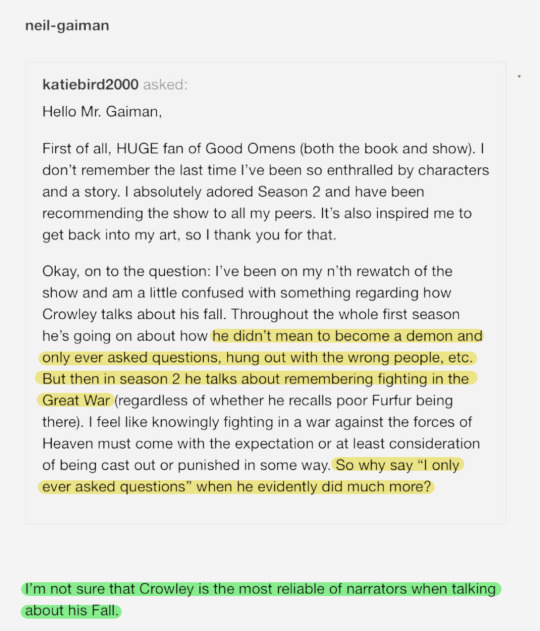
Crowley's implication of not deserving to fall and Neil Gaiman saying that Crowley isn't a reliable narrator when it comes to his fall are certainly opposing views but why can't they both be correct? (we're exercising DBT today for fun)
If we know anything about Good Omens, it's that the entire theme of the story hinges on perspective. How the same instance can be viewed dramatically different depending on who is watching and where their morals are aligned. For both of these things to be true, Crowley would probably see his fall as a punishment for having simple curiosity. To Neil Gaiman, a much more neutral, outside observer, Crowley's fall wouldn't have been such a random, out of place happening. Which leads me to wonder what the Great War was even about. (I'm assuming the Great War happened before Eden-)
Perhaps it was about asking questions and making suggestions.
It seems kind of silly to say but the more I think about it, the more it makes sense. If the Great War is what caused many of the angels to fall, it would make sense that the center of that war would be a lack of faith. And the thing about faith is a lot of the time there's this idea that you should hang your questions aside and choose to believe- questions can oftentimes be seen as a threat or a lack of faith. Even more so are suggestions. I believe Aziraphale's reaction to Crowley's questions and suggestions in S2E1 are a perfect example of this being just the case.
I can imagine Crowley, and many of the higher ranking angels such as Lucifer and Beelzebub finding each other to all have the same questions and suggestions and doubts about the future of the universe. Having the rank they had, I could see them planning to go to God to ask questions- they, at this point, have no reason to believe anything should happen to them should they ask questions.
With them having those questions, I could also see there being a rift between the Angels who wished to ask questions, and those who strongly opposed it. And as they debated it, it snowballed out of control turning into a full-on war.
(Small note: sure maybe they became demons before the war actually officially starts but I still think this theory could hold pretty strongly.)
Crowley was on the side of asking questions and making suggestions. They did in fact fight with the other angels who ended up falling. Her questions and suggestions were viewed as a lack of faith. If you view faith as being able to hang up your questions and doubts, it actually was a lack of faith. To Neil Gaiman and katiebird2000's point, Crowley's fall was in fact just the consequences of his actions. To say "all I ever did was ask questions" is to negate all of the other things Crowley did.
(I'd also like to throw out there that faith in this circumstance is faith in God, not faith in doing good which I think explains a large portion of Crowley's morality throughout the story because God and good are not synonymous. Crowley believes in doing the right thing but does not believe God is the one to do it.)
And so Crowley fell. To his point of view, he fell for simply having questions. So when Crowley heard about the Tree of Knowledge, she had to go. When they heard the word "Knowledge" they probably thought taking a bite would answer their questions- provide her with the thing she was denied in Heaven. It was also the perfect first act of rebellion- to indulge in something he was not meant to indulge in.
But when he took a bite, something completely different happened. The wool over her eyes had been peeled back and suddenly the universe became so much more complicated. Perhaps tempting Eve to eat the apple was originally about temptation but then became an act of setting them free- to give them the right to choose just like the apple did for Crowley.
And everything from there on is history.
I think that's why Crowley not only loves humanity but also why Crowley himself is so human: that is the one thing he shares with humanity- the knowledge and understanding that good and evil are not mutually exclusive. Knowing that good and evil are tied by a red string of fate, destined to dance circles around one another eternally.
#thank you so much if you read that whole thing#i have a tendency to ramble sorry 😭#I'm gonna make another meta to piggy back off this one#about aziraphale because the way he factors into all of this is interesting to me#this theory also sheds a lot of light onto whats in store for the future so sit tight!#good omens#crowley#ineffable husbands#aziracrow#aziraphale#good omens 2#ineffable idiots
21 notes
·
View notes
Text
There are so many interesting things in this drama and on rewatch I keep finding more and more. It's such an interesting yet fitting narrative thing that the cartoonist, who started out believing he's a god, gets not only transformed into a character but controlled by the narrative as much or more than KC (and in the end, he cannot exist in the real world at all, unlike KC.) It makes so much sense - all the rest of the people we meet exist only in one world or the other, as @myechoecho pointed out. But by creating a copy of himself in W world and giving him his face, he muddied the water and once he ended up in the W world, the narrative merged not just their memories but their fates.


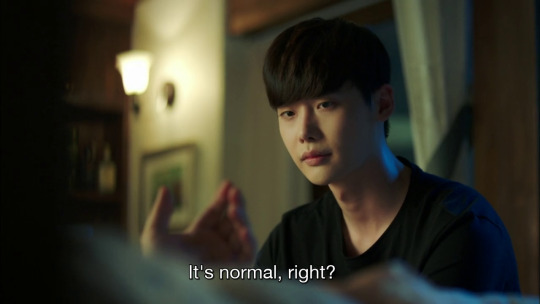
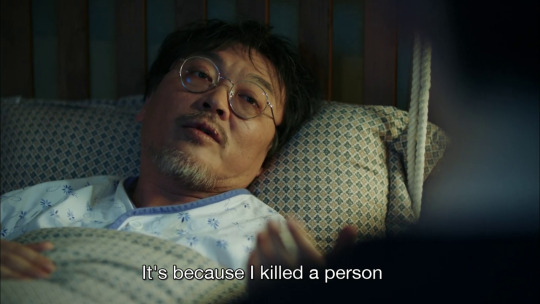
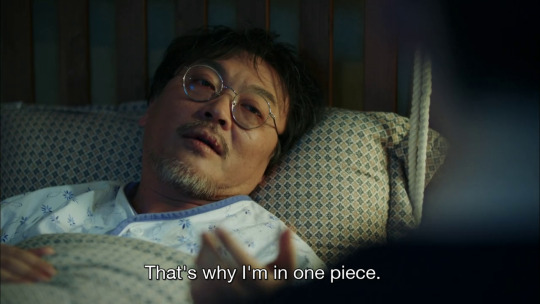

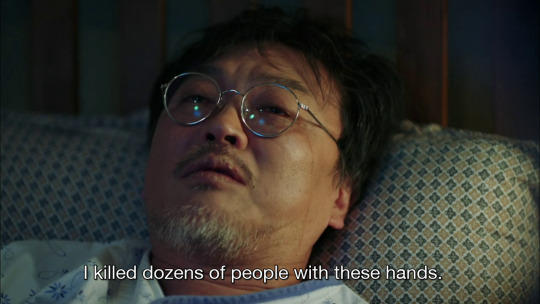

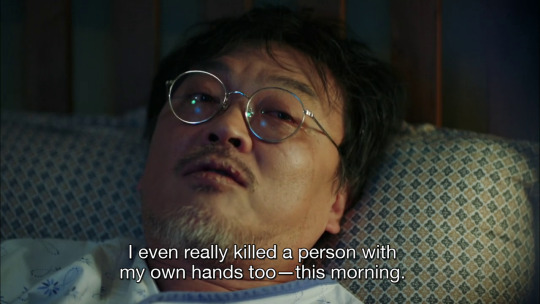

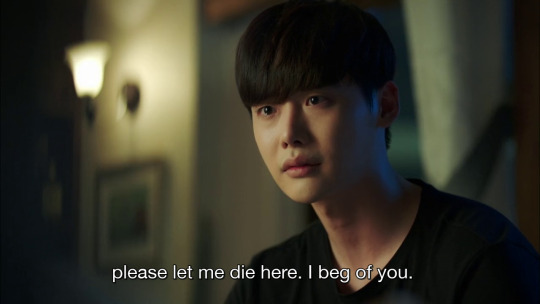

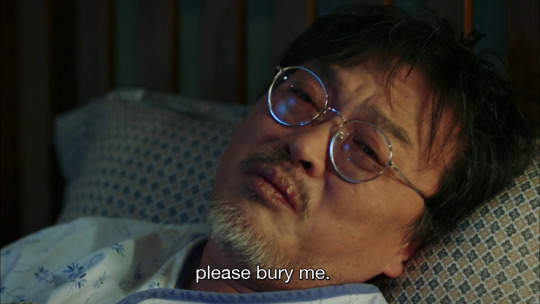
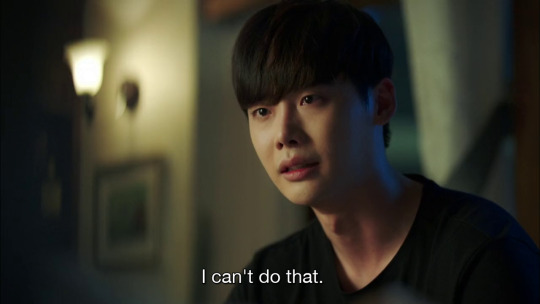
As he points out, he's now burdened by narrative fate as much as KC is - narrative punishes KC when he does something that goes against his basic character as determined by the story (I don't mean little things or having self-awareness, but when he escapes from his punishment or seemingly leaves his friend to die) but it also punishes dad if dad doesn't do evil. Perhaps punishes is a wrong term since there is no moral judgment in it - it's basically they are slotted into certain broad archetypes and if they don't follow, the story doesn't need them so it starts erasing them.

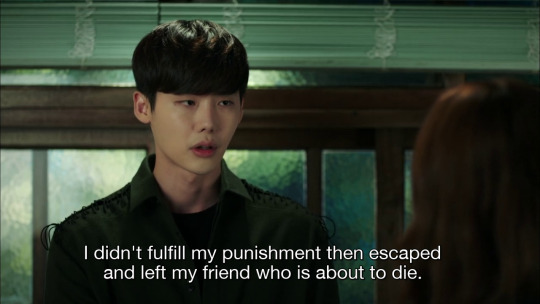
The other thing I find so fascinating and making so much sense in retrospect is KC's correct deduction a few eps back that W world isn't really a comic per se - it's a real, parallel universe but the comic is set in it and can change things in it and control characters it actually created. Comic/narrative sometimes due to cartoonist and YJ and sometimes by itself due to narrative drive can superimpose itself and override the real world flow of W world but W world is actually a real world.
And if you think about it, that helps explain why at the end KC is able to be a proper person in our world. Because yes, he started out as a character - but he became real (even if controlled by the narrative) the moment he was created - he was a real person in a real world even if he was created and controlled by the narrative, not born the usual way/possessing untrammeled free will. He develops free will and self-awareness of the situation and frees himself from predestined narrative (or does he? He doesn't free as much as complete it - even if he changed the arc of it; even if he never developed awareness, the moment the comic was complete, if it was ever complete to narrative satisfaction and he was alive, he'd have probably been released from following the narrative fate as narrative would have disappeared, and lived a life as normal as any other, just in W world) but he doesn't become a real human at the end - he was always a real human, just a controlled and artificially created one. The only difference is he now moves to our world. (Side note - and the philosophical question is of course, was he ever that different from "normal" - yes, he was created by cartoonist, but people are "created" by their parents, and cartoonist gave him various characteristics, but bio parents do too - it's called genetics. Even his fate - plenty of not-characters believe in same. And he fights so hard to make his own choices. He's different in his circumstances of course, but it's a matter of degree, not wholesale nature.)
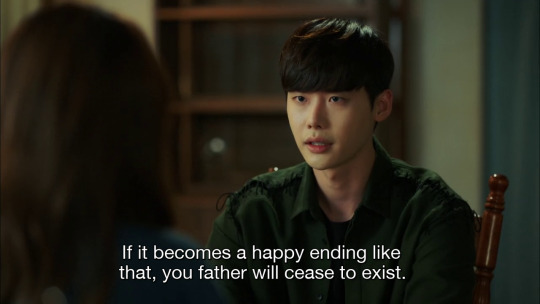


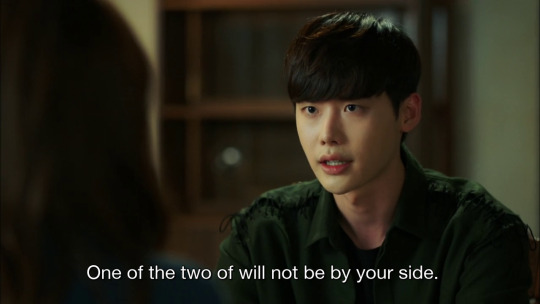


This moment!!! KC has constantly fought fate, fought predetermination, fought the universe itself - everything that tried to take control of his life from him he fought and fought and fought. But here he cedes control over his fate utterly to her, it's her choice and his trust in it that just gets me.

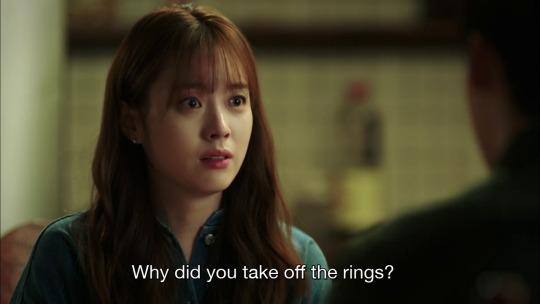
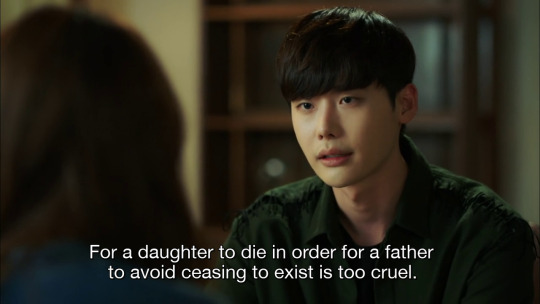
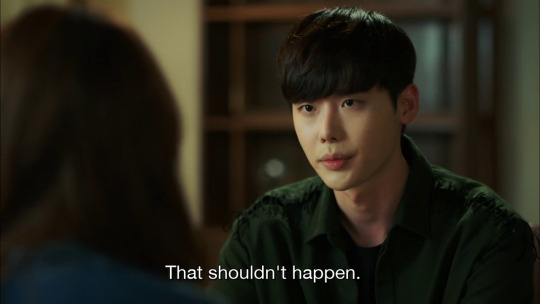
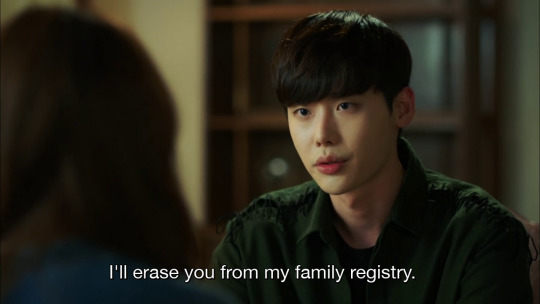

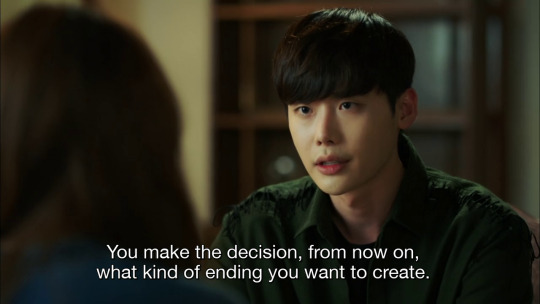
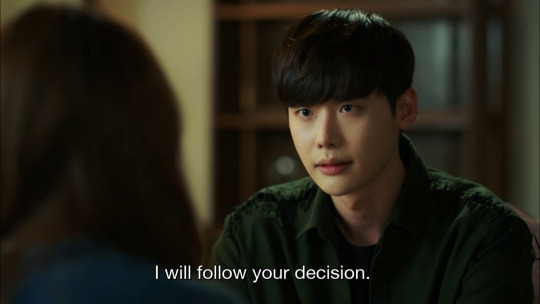
16 notes
·
View notes
Note
from a never seen poor things anon, what do you hate about poor things? (ive heard its ableist...)
ok so before i get into anything, i would like to state that it was made by cis men (directed by a greek cis man, written by a scottish and an australian cis man). if it was done by cis women, i would still side eye it though. also, emma stone was a producer, so technically she had a say in just how much she showed of herself (the practicality of it you can argue but that would make this like an entire essay long).
what i can say, without spoilers, is that the movie reads like the study of "liberation" in the white feminist sense through white men's lense. if that's your thing (or choice feminism) then maybe you can put through yourself this. the writing is very much tony mcnamara (from "the great"; i knew it was him before i even looked at the credits) so if you miss his style of dialogue, then you will definitely enjoy at least that. the aesthetic is nice and you can tell that it took a lot of hard work, but also you have to tolerate a fisheye lense shot like every five minutes.
if you don't mind spoilers, then you can click "read more" - although i don't think i'm saying anything that hasn't been said before
i have to put out another disclaimer: i don't think you should only depict topics in a "HEY THIS IS A BAD THING!" manner or that you can only portray morally correct things, so i don't think this movie would have irritated me so much IF we had movies that dealt with similar topics in a more honest, more radical view (but like who am i kidding it's hollywood) or if people didn't hail this as barbie for ao3 like ???????????????? i mean i guess you lot are right about the white feminism…
the story begins with a pregnant woman killing herself (victoria, also played by emma stone) because she simply cannot tolerate the fetus/the idea of being a mother. the movie also implies that she was impregnated against her will by her husband. then doctor godwin baxter (willem dafoe) uses her for his "experiment" and he says, out of mercy, doesn't revive her but instead puts the baby's brain into the pregnant woman's and so bella baxter is born. this read as punishment for wanting to end a pregnancy (even though i'm sure it wasn't meant to) and that is just a really triggering to me. when bella learns of this later, it doesn't exactly have much of an effect on her though so all is jolly! not a single thing to ponder over! not the fact that her mom didn't want her and she killed herself, noooope. has no effect on her whatsoever!
so the premise of the entire thing is that we watch this baby grow in a grown woman's body. the movie is in b&w for a while because babies don't see color (about 4 months but we are never given a scale of her age) but her sexualization begins here already: one of whom she is betrothed to (so she never leaves the mansion) is max mccandles (ramy youssef) who also calls her the R slur (00:07:29,792 --> 00:07:31,625 "What a very pretty [R-slur]") and then duncan wedderburn (mark ruffalo). i'm not sure why that slur is resurfacing online and offline but i find it very disturbing, no matter what excuse people try to use. use any other word, literally. there is the question of adults who (if i'm not using correct terms, feel free to tell me) are cognitively challenged. is this meant to say something about them? does the movie not even want to entertain that people like bella in this stage exist and live their lives?
i feel like i've only yapped about the plot SORRY. the rest of the story is bella learning more about the world, mostly through sex save for one philosophical stage on a boat (where we meet the one man who does not sexualize her! hurray! harry astley, played by jerrod carmichael). i don't think the sex scenes were like too explicit (i'm sure hbo had done way worse back in its day…) as people say they are. do i think it was necessary for the story? not really. yes, sometimes children are aware of sexual things but they should be educated (to prevent predators) and not engaged in such acitvities. as she was not educated, predators crawl over her like duncan. but it doesn't read like that, not to me. i think they tried to portray her as a willing participant and for you not to even question whether she wants it or not, and rather as "female empowerment" like okay…
and then comes the paris part (sex work/prostitution) which can be read in many ways. bella learns more through sex paid for by strange men, duncan slutshames her and she leaves duncan, decides to be a doctor. a lot of progress is made in this part and there are some good lines but one line just… meh (01:43:23,292 --> 01:43:25,583 We are our own means of production.) so that's something to keep in mind.
anyway, shenanigans ensue, she ends up back where victoria escaped from and the husband wants to also keep her in the house and impregnate her. maybe something about how you cannot escape the system meant to encage you? no idea. in the end, she doesn't kill the man but rather replaces his brain with a dog's. is this meant to read as revenge? against the husband or against the doctor? who knows. the doctor dies but at that point i was just sooo over it. in the end, bella takes over her first prison, the mansion, as she is now its mistress, but what does that say exactly? the system is good as is, any change will just land us in worse places and we just have to make our space in it?
9 notes
·
View notes
Note
Hey y'all! Loved the new episode, and wanted to chip in on one of the later points - videogames, especially in relation to the "Grey" Jedi concept. Knights of the Old Republic II really did some irreversible damage in that regard, as much as I love the game (though I prefer the first one). Kreia is one of the most central characters in regard to shifting morality debates in Star Wars (in universe and from fans alike) imo, and I'd honestly be super interested in hearing you three cover either or both of the games in the podcast, although I understand that's highly unlikely since none of you have played them. But she is extremely relevant to this topic because she preaches about neutrality and that there's more than just ~dogmatic thinkings of light and dark~, and your relationship with her suffers if you are kind and altruistic and get too rooted in the light side and she's like...one of *the* characters that kind of gets credited with developing a "grey" philosophy in-universe? But people always bring her up as if she's this great point of sensible consideration and not actually, as it turns out, a master manipulator trying to purge the Force from the galaxy (or something like that at least? It's been a while since my last playthrough lol) that lies to you all the time to get you to do what she wants (because she was so crazy bananas both the Jedi and the Sith said "no thank u :)" - well, with a bit more nuance but you get the gist). Really, it's a bit like people falling for Palpatine's anti-Jedi points all over how they talk about her philosophic arguments without bringing that up. But yeah, I thought you might be interested in that. Also, I think KotOR might be what people meant with being able to unlock Dark Side powers as a Light sider but you are absolutely correct that it's a mechanics vs story issue (especially since some powers are indeed alignment-locked AND making dark side choices does impact the character (apart from story, ending and relationships to your party members). It's a bit of a simplistic gimmick, of course, but the further you get into the Dark Side on the alignment, the more it's visible - sickly skin colour, cracks in the skin and flesh, your eyes change...stuff like that. I don't think using Dark Side powers actually pushes you further down the alignment, but the intent is obviously not for Light Siders to mix and match however they like).
Anyway, I'm so sorry for rambling on for so long, but I thought you (or someone, at least :D ) might appreciate that additional info. Keep up the good podcasting! :)
OUR FIRST ASK! I'm so glad you're enjoying the podcast, thank-you so much for listening to us ramble on for an hour once a month!
This is all really interesting! I've read a few metas about the Star Wars video games and the characters within them which is partly why I chose to briefly include them in the episode (and also because I am familiar with Jedi: Survivor which has its own "dark side" mechanic for the main character that was relevant to the discussion). Aside from Jedi: Survivor, I wasn't necessarily referencing any one specific video game, I assume it's probably a thing that's come up more than once.
As far as my reaction to Kreia goes, just based on your description of her, the idea of there being "too much light" just isn't how Lucas's own worldbuilding worked. It's clearly trying to hit on the idea of "balance" being equal amounts of light and dark usage, as opposed to balance being acknowledging darkness EXISTS (in yourself and in the universe) in order to keep yourself from acting on it. There just isn't a way to be "too light" or something like that, there's never "too much" kindness and compassion and selflessness in the world. In this sense, the video games are just going to fall into the same category as the rest of legends and EU stuff, in that they often just do their own thing based on their own interpretations of Star Wars, but it doesn't mean it actually fits with what Lucas himself was trying to get across about the philosophy of the Force and the Jedi in his own stories, and that's primarily what we're using as a base to discuss Star Wars from.
If any of us ends up playing KOTOR, we can certainly try to bring it up more often. I don't think we have any plans of doing more video game stuff currently, but if the KOTOR remake ever comes to pass, maybe I will!
-Mod Sugar
15 notes
·
View notes
Text
WHY YOUR MORALITY IS MY PROBLEM: modern holdovers from ancient theology
James Dobson, founder of the ultra-conservative Focus on the Family organization, reputedly said of the 2012 Sandy Hook mass shooting, “I think we have turned our back on the Scripture and on God Almighty and I think He has allowed judgment to fall upon us.”
As heartless as that sentiment sounds today when addressing the murder of 20 first-graders (and 6 adults) at an elementary school, it reflects a once-common theology that emerged about four thousand years ago in the ancient near east (ANE*), then bled into the Mediterranean basin and developed an astonishingly long half-life. It’s why some Christians (et al.) are so, so concerned with what their neighbors are doing behind closed doors. Or on their front lawns with all those Pride flags.

In some ways, ANE and Mediterranean religion had a lot in common, being traditional and focused largely on sacrifice/action (orthopraxic). Over time, some orthodoxic religions also arose in that area. So, first, let’s do some quick defining.
Orthopraxic religions focus on what one DOES, not what one believes. Performing the sacrifice correctly, honoring the gods/ancestors appropriately…that’s how one shows piety. Infringing against purity laws or other affronts to the gods (impious actions) can result in expulsion from the community. Fights over correct practice can lead to schism in a community.
Orthodoxic religions focus on what one BELIEVES. Thus, they need some form of authoritative text to determine what IS right belief, resulting in the emergence of a canon (e.g., Zoroastrian Avesta, Jewish Tanakh, Christian New Testament, or Muslim Qur’an). In Orthodoxic religions, wrong beliefs (heresy) can result in expulsion from the community. Fights over correct belief can lead to schism in a community.
(There’s yet a third focus, orthopathic, but that largely doesn’t apply here. “Orthopraxic” can also apply to ethics-based religions, but here, it applies to ritual/cultic behavior.)
Most religions have elements of all three, but it matters where the weight falls. Yes, religions can emphasize two sides of the triangle more heavily, less on the third, but even then, one point will be the chief measurement of devoutness among followers. This also helps us understand why two religions might not understand each other very well sometimes. They’re trying to impose one set of “What religion is for” ideas on another, with entirely different assumptions.
The religions of the ANE and Mediterranean had much in common in terms of the purpose of religion: to maintain the health of a community. This depended on the piety of that communities’ members. Their gods weren’t moral in the modern sense, but could be jealous, fickle, and petty.
Why were they gods then?
Because they were immortal and more powerful.
Yet an important difference between (many) ANE and Mediterranean religions were the concepts of sin and “mesharum” (divine justice/equilibrium). If the latter existed (sorta) in Mediterranean society, “sin” really didn’t. Impiety differs as it can include ritual matters too. So, if murder (especially kin murder) created uncleanness anywhere and is a moral/civil matter, menstruation and sex also created uncleanness, but were not moral/civil matters defined as “bad.” So “unclean” ≠ “sin.”
To be unclean is a matter of cultic purity, different from moral purity. Yes, ANE religions also had ritual uncleanness, to be sure. And yes, some things that make one unclean also have intimations of “badness” without being so extreme as murdering someone. Yet I want to underscore the difference because it’s very real and too often ignored/misunderstood/unfairly conflated.
Many Mediterranean religions did not have “sin,” just unclean and impious. MORAL/ETHICAL matters were dictated by civil law and later, philosophic discussion. Not religion. Yet in the ANE, moral infractions were affronts to mesharum (divine order) and were therefore a religious matter. This oversimplifies, but smash-and-grab works for now. We find actions (like iconoclasm) in the ANE that didn’t often apply in the Mediterranean. (Iconoclasm is the deliberate theft, or in extreme cases, destruction of religious icons or structures.)
Yet what both groups shared was a sense that the gods had, well, “bad aim.” If people in a community were impious and/or sinful, that might draw the ire of the gods. Plagues were often seen as divine retribution for the impiety and/or sin of one or more members of that community, but not necessarily all of them. This led to the exile of impious individuals, as well as the ANE “scapegoat” ritual, et al. (If you’re familiar with the plot of the Iliad, Apollo punished the entire Greek army for the impious actions of Agamemnon.)
I could DIE from your impiety/sin committed in my town/community.
That makes your morality my business.
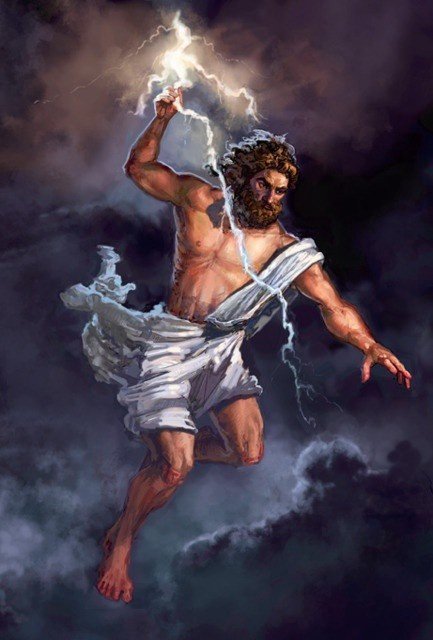
In addition, especially in the ANE, war on earth was believed to reflect war in heaven. Gods had cities and peoples, not the other way around. They chose you, you didn’t god-shop—hence Israel as a “chosen people.” Well, yeah, pretty much every ethnic group was chosen by some god(s). But as a result, if your side lost in a war, then—theoretically—your gods were weaker. Maybe you should go over and start worshiping their gods. Yet that didn’t sit well with most groups, so by the Middle/Late Bronze Age, we see an emerging idea that my god isn’t “weaker” than yours, rather my general “set forth without the gods’ consent,” or my god permitted the other god(s) to win for whatever reason…usually due to sin or a lack of piety among his (or her) people. Of course we find this in the prophetic literature of the Hebrew Bible, but it’s in a lot of other ANE literature too. Nabû or Marduk didn’t lose, they “went to live with” Ashur for however many years—although the winning side will portray the victory as Nabû and Marduk traveling to Nineveh to bow before (e.g., submit to) Assur.
Again, this is simplified, but we don’t see this sort of language used in Greece where Hera would bow to Athena because the city-state of Athens defeated Argos, even if, as promachos (foremost in battle), Athena might be expected to win in any conflict between the two (as in Euripides’ Children of Herakles). Hera is still queen of the gods, and—even more—these are shared deities. We also don’t see it because notions of “sin” don’t apply and only a handful of wars were ever called “sacred”—all of them concerning Delphi and cultic purity. At least one of those is mythical, the second probably didn’t happen, and the third (which certainly did happen) was labeled “sacred” only by one side. Greek gods just weren’t seen to uphold justice in the same way. Roman gods were more concerned with such things, but still not as we find in the ANE.
Ergo, the ANE faced the problem of theodicy: if god/the gods are good/just, why does tragedy happen?
Early explanations for tragedy were simple: those who suffer must have earned their suffering, sometimes referred to as Deuteronomic Theology: “good things happen to good people”/“bad things happen to bad people” (and maybe their neighbors too, by chance).
Pushback against this notion emerged around the same time a more nuanced view of loss in war emerged. People began to ask the corollary: “Why do bad things happen to good people?”
The (c. 1700 BCE) Mesopotamian Ludlul bēl nēmeqi (The Poem of the Righteous Sufferer) attempted an answer. About a thousand years later (600s-500s BCE), the Jewish Book of Job took it on as well. In both, the protagonist asks, “Why does Marduk/Yahweh punish me when I’ve been a faithful servant?” Both protagonists were previously wealthy/powerful, which was seen as divine approval. Losing that wealth/health suggested they had offended their god (and are being punished). Yet each one claims he did not sin—so why?
The answer in both works is similar: there’s not really an answer. Marduk restores Šubši-mašrâ-Šakkan, who ends the poem with a prayer of thanksgiving. Job has a chat with Yahweh, who essentially tells him, “You’re a measly mortal, don’t question me.”
The KEY element in both, however, isn’t the answer, but the assertion that a good person can suffer. They didn’t earn it; it just happened. They remained good and, eventually, their god restored them to their prior station, and then some.
Ergo, if you’re suffering, just be patient. Don’t curse God and die. (As Job is advised to do.)
Today, we may find such an answer wanting but need to recognize it for an advancement on the theology of tragedy.

Some, however, get stuck in these time-locked answers because they can’t allow their religion to grow. Or rather, they can’t acknowledge that their religion/theology evolves over time, because if it evolves, it wasn’t perfect from the beginning. And that challenges their understanding of their god.
Yet the real fly in the ointment is the notion of a perfect and infallible canon.
This brings me back around to what a canon is. It just means “an authoritative text,” but how that text is understood has nuances. INSPIRED ≠ INFALLIBLE. Most all followers of a canonical text believe it’s inspired by God, but not all (or even most) believe it’s infallible. (Islam is its own category here, note.) That creates some problematic GRAYS.
If it’s only inspired, written by humans with human foibles and history-locked understandings, interpreting it becomes complicated and can lead to disagreements. Taking a literalist view sweeps away the messiness. “God said it; I believe it; that settles it!” Black-and-white.
Those who believe in Biblical literalism/inerrancy (which includes a good chunk of conservative Christian Evangelicals and all Fundamentalists**) will argue ALL the Bible is true. If it’s written by God, it must be perfect from the get-go. Thus, a clash is created between simpler versus more nuanced views: Deuteronomy vs. Job. If an earlier view must be as true as any later one, that reduces everything to the most elementary version. It can’t evolve/grow up, yielding what feels to most like a very archaic (and often harsh) worldview.
In any case, both the traditional orthopraxic and orthodoxic religions of the ANE/Med Basin believed God/gods punished people who offended them. AND these punishments might “spill over” onto family and neighbors.
Ancient divine collateral damage.
Ironically, this is WHY early Christians were prosecuted by the pagan (e.g., traditional) Roman and Greek religious establishments. Christian failure to participate in common civic religious cult could earn divine ire. For their first two/two-and-a-half centuries, Christianity was labeled a religio illicta (illegal religion)—in part for “failure to play well with others.” E.g., make sacrifices to the appropriate Greco-Roman deities. Thus, when disaster struck, a scapegoat was sought. Those antisocial Christians are to blame! They don’t sacrifice to the gods and so, offended XXX god, who is now punishing ALL of us with YYY.
Classic ancient religious thinking, but it’s one reason I find current conservative Christian opposition to Teh Gays, trans folks, etc., enormously ironic. The persecuted have become the persecuting.
I want to emphasize that large sub-groups of Jews, Christians, and Muslims have evolved past such theologies. Yet others have not and stubbornly cling to ancient mindsets. That’s why they argue the mere presence of LGBTQI+ people will bring down the wrath of God on ALL.

Talk of “grooming” and “protecting children” is just an attempt to make palatable a belief they know won’t fly with most people, who they consider deluded by The World (e.g., the devil). Trickery is therefore required. As they’re deeply afraid themselves, they understand fear and use it to motivate others. Many are perfectly happy to make their beds with “unbelievers” long enough to get their agendas passed. God will forgive them.
This, too, is rooted in ancient ideas (discussed above) whereby a people’s own god might employ the enemy to punish them (or others). Thus, a sinful person can be utilized on the way to righteous ends because the victory of God wipes away all else. Using the enemy to effect God’s will just proves that God is in final charge of everything after all. It’s the ultimate PWN.
I hope this helps to explain where these ideas come from, how they originally emerged, and why a subgroup of people still cling to them.
————-
* While Egypt influenced the ANE, as well as Greece and Rome, and is often shoehorned into the ANE, I consider Egypt as NE Africa. It deserves to be treated on its own, or in relation to neighbors such as Kush.
** Fundamentalists and Evangelicals tend to be equated but are not the same. Also, not all Evangelicals are conservatives (although all Fundamentalists are, by definition). Enormous variation exists between Christian denominations, which range from ultra-conservative to (surprise!) ultra-liberal. There is as much of a hard Christian Left as there is a hard Christian Right. We just tend to hear far less about them.
#iconoclasm#mesharum#deuteronomic theology#book of job#poem of the righteous sufferer#ancient theology of tragedy#theodicy#ANE theology#ancient Mediterranean theology#Classics#ancient near east#ancient religion
25 notes
·
View notes
Text
By: Mark Goldblatt
Published: Feb 7, 2023
Several years ago, in the pre-pandemic world of in-person meetings, a newly hired colleague at Fashion Institute of Technology proposed an LGBT-themed sociology course before the School of Liberal Arts. This is a necessary step in getting the course approved by the college-wide curriculum committee. It’s a time for constructive feedback and occasional tweaking before the final committee vote.
It was a good course. The proposal was clear and concise, indicating not only a command of the relevant literature but a sensitivity to students’ interests, expectations, and ability to handle the workload. But I noticed an apparently minor, easily correctable issue. Among the learning outcomes listed was a requirement that students develop a greater acceptance of LGBTQ+ perspectives and rights. That struck me as problematic. I happen to think that such acceptance is a good thing, but to stipulate it as a learning outcome raises a knotty question. If a student masters the course material, turns in the required work, and passes the exams, but doesn’t exhibit that acceptance, is he going to fail?
After expressing my general admiration for the course, I raised my misgiving in the following way (and this is nearly an exact quote): “We need to keep in mind that we’re a state university. Our mission is to pursue, ascertain, and disseminate objective truth, and to equip our students to do the same. Given that mission, I don’t think we can list a learning outcome that requires students’ assent on a matter of personal morality. The other learning outcomes are fine. You don’t need that one, so I’d just cut it.” My colleague was fresh out of graduate school and not yet tenured, which (theoretically) put her in a vulnerable position. Nevertheless, she became apoplectic; so angry, in fact, that she had difficulty getting out her first sentence. “I can’t believe people still think that way!” she spluttered. “Queer Theory has deconstructed objectivity!”
Her words hung in the air as I glanced around the room. Not a single faculty member, not even those in math or sciences, seemed fazed by her categorical statement. Since I was a tenured professor, I was reluctant to debate an untenured colleague during a school meeting. So, I let the matter drop. The course was approved without revision by the School of Liberal Arts, and went on to gain approval by the curriculum committee. And that is how my college got into the business of winning converts.
That moment haunts me as I begin my final semester before retirement—not only because faculty on the state payroll have deliberately crossed the critical line from pursuing the truth to professing The Way, but also because the Enlightenment sensibility that finds such mission creep objectionable seems to be passing from the scene. The “deconstructive turn”—as the critic Christopher Norris once called it—is nothing more than a verbal sleight-of-hand. It invites us to tease out secondary and tertiary senses of words to show how a text contradicts what it seems to be saying, free-associate our way to philosophical banalities or outright non-sequiturs, and finally glaze the mishmash with a layer of impenetrable jargon. If a reader is foolish enough to attempt to make sense of what is being said, he’ll get bogged down before he can figure out nothing is being said at all.
When Jacques Derrida, the renowned “father of deconstruction,” was awarded an honorary degree by Cambridge University in 1992, 20 of the world’s preeminent philosophers—including W.V. Quine and Ruth Barcan Marcus—signed a letter of protest, in which they argued:
M. Derrida describes himself as a philosopher, and his writings do indeed bear some marks of writings in that discipline. … In the eyes of philosophers, and certainly those working in leading departments of philosophy throughout the world, M. Derrida’s work does not meet accepted standards of clarity and rigor. … M. Derrida seems to us to have come close to making a career out of what we regard as translating into the academic sphere tricks and gimmicks similar to those of the Dadaists. … Many French philosophers see in M. Derrida only cause for embarrassment, his antics having contributed significantly to the widespread impression that contemporary French philosophy is little more than an object of ridicule.
The claim that Queer Theory has “deconstructed objectivity” means only that a certain number of academic performance artists have doodled with a cluster of words related to the concept of objectivity in order to gain university employment, win friends, and influence a distressingly large number of gullible fans. But no epistemological breakthrough has come of their efforts: if it had, it would be self-refuting since it would consist of an objective truth about the impossibility of objectivity. (At a lecture I attended 40 years ago, a debonair British postmodernist stated that Derrida had shown us how it was possible to formulate a consistent argument with a contradiction in it. When I inquired how, in that case, we could recognize an inconsistent argument, the question was met with actual hisses from his acolytes. I’m still waiting for an answer.)
Objectively true statements are still made on a regular basis. The statement “Objectively true statements are still made on a regular basis” is itself objectively true. And Queer Theorists make objective truth claims all the time—as when they cite statistical evidence of harms visited upon the LGBT community or proving the reality of climate change. One of the silent faculty members at the meeting I mentioned, also near retirement, had devoted his entire distinguished career to combatting the effects of global warming. You’d think he’d be miffed at the suggestion that such effects were not objectively real. But no, he just sat in silence like everyone else.
Either he didn’t understand or didn’t take seriously the implications of what our new colleague was saying. The latter possibility seems the far likelier one. My sense, based on hundreds of informal conversations I’ve had with STEM faculty, is that people working in the hard sciences tend to roll their eyes at the alleged insights of postmodernism. They inhabit a world in which truth is still gauged by correspondence between belief and reality, and in which reality exists independently of our beliefs about it. Generally speaking, they don’t give a rat’s ass about discourse communities and meta-narratives. They want to know if the equations balance, if the instruments work, and if their hypotheses match empirical outcomes. In other words, they are interested in discovering if what they believe to be true is objectively true. They are certainly not interested in the ethnicity, sexuality, or gender identity of the people making truth claims.
Put all of that together, and you’ve got the makings of a schism. The humanities and social sciences are undergoing a mission reversion—they’re returning to a pre-Enlightenment view of the purpose of higher education. Prior to the Enlightenment, universities were sites of religious instruction that trained clergy. Harvard was founded in 1636, a mere six years after the settlement of Massachusetts Bay, to ensure that future generations of New England Puritans would be served by learned ministers. That goal is found among Harvard’s original “Rules and Precepts”:
Let every Student be plainly instructed, and earnestly pressed to consider well, the maine end of his life and studies is, to know God and Jesus Christ which is eternal life (John 17:3) and therefore to lay Christ in the bottome [i.e., at the base of the boat, to keep it steady in the water], as the only foundation of all sound knowledge and Learning.
That’s a version of what we’re seeing with the rise of the subjectivist movement in the humanities and social sciences. It is a new secular faith, a version of The Way. Instruction in radical progressive curricula is baptism by accreditation. It’s witness and testing. You gather for three hours a week to dwell in the spirit, commit yourself to individual rituals and collective causes, despair the fallen state of humanity, call out and cast out demons, immerse yourself in sacred texts and memorize venerable chants, then venture forth to spread the gospel. The end is performative, sacramental. Let me tell you the many ways you’re oppressed so that you may be a river to the masses.
Increasingly, that is the state of the humanities and social sciences at public universities in the US. Whatever you think of that development, it signals an existential crisis for higher education because instruction in the STEM fields at American universities remains traditional, objectively focused, and globally competitive. The reversion of the humanities and social sciences to religious preparation cannot coexist indefinitely with the Enlightenment mission of STEM instruction. Something has to give.
What, for example, becomes of science textbooks that report that only female mammals give birth? (Pity the poor seahorse, hitherto famous as the only species in which the male gives birth. But for how long?) You cannot be told in your morning sociology seminar that the pursuit of objectivity is an instrument of white supremacist culture, which must therefore be deconstructed, and then be told in your afternoon biology class that identical twins are objectively always the same sex.
It’s natural to expect the demand for severing ties to come from the professoriate on the STEM side, from a desire not to be sidetracked in their pursuit of objective truth. More likely, though, as evidenced by that liberal arts meeting at FIT, the demand will come from the humanities and social science side, caused by the unbearable adjacency of reality-based standards and scholarship to the postmodern insistence that the demand for objectivity is oppressive.
Entrance into STEM fields requires rigorous standards of assessment, as does progression and graduation. Rigorous standards of assessment, however, don’t produce equity or (objectively!) diverse student populations. Asian students are currently overrepresented in STEM, black students underrepresented; male students are overrepresented, female students underrepresented. According to the tenets of progressive activism, demographic imbalances of that nature constitute de facto proof of racial and gender bias since in an unbiased system every demographic would be proportionally represented. How long will student activists, encouraged by humanities and social science faculty, tolerate this alleged injustice on their campuses?
The disintegration of academia is coming. Whichever side precipitates the break, it will be a necessary development. Higher education is a serious intellectual endeavor, and nothing is less intellectually serious in contemporary academia than the suggestion that the pursuit of objectivity has been discredited. Empirical observation, mathematical inquiry, inductive and deductive reasoning, and falsifiability are the sine qua nons of higher education. As courses of study in the humanities and social sciences depart from such things, they cease to be higher education in the Enlightenment sense.
[ Via: https://archive.is/vQvgg ]
==
It's pivotal moments like this that inform what comes next. That realization something was really wrong here, with that hesitation, that second-guessing, that telling the truth might upset them, that it would just be easier to let this one slide, that instinct to just go along to get along, and the creeping recognition a group delusion was going on.
Who would have thought that the downfall of western academia could be powered by the worst, most pretentious and puerile French philosophy which can be encapulated as an academic formalization of the Equivocation Fallacy, and language games worthy of a 7 year old who just discovered a book of knock-knock jokes?
It was a mistake to think that nobody would take this seriously. It was a mistake to think that it wouldn't leak out of the bogus Fantasy Studies domains within Humanities which they'd invented and credentialed themselves in. And it was damn sure a mistake to give them a seat at the grown-ups table as far as knowledge claims and knowledge production.
To paraphrase Sam Harris, those who reject objective reality belong at the margins of our societies, not in our halls of knowledge.
Denying objective reality should be regarded as an announcement they do not live in it. This is a definition of delusional, not a definition of intellectual.
#Mark Goldblatt#objective truth#objective reality#objectivity#postmodernism#deconstruction#word games#language games#language manipulation#subjective reality#lived experience#science#STEM#corruption of education#corruption of knowledge#Jacques Derrida#subjectivism#postmodern philosophy#postmodern nonsense#Enlightenment values#Enlightenment#evidence#reason#religion is a mental illness
25 notes
·
View notes